— Pages 10-11

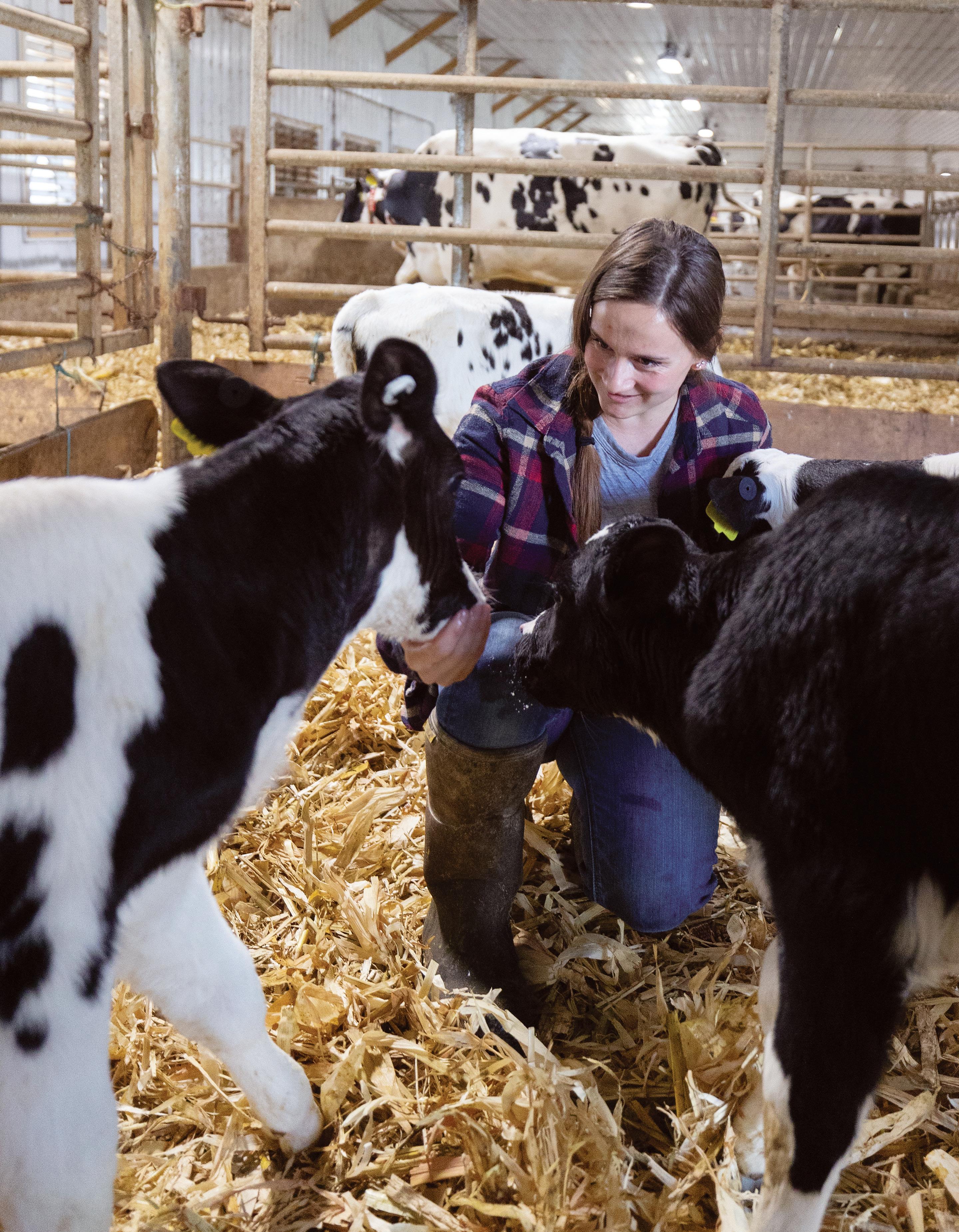
September 28, 2023 • Newspaper of the Archdiocese of Saint Paul and Minneapolis A holy calling Dairy farmer Quinci Schmidt
on calves Sept. 14
the
of a family
Rogers
by her parents, John and Staci Scherber. DAVE HRBACEK | THE CATHOLIC SPIRIT ARCHDIOCESAN SYNOD’S 72 5 | SYNOD ON SYNODALITY 6 | TWO VATICAN II SERIES 8 SAINTLY FAMILY RELICS 13 | EVANGELIZING WITH COFFEE 14 | RESPECT AT THE END OF LIFE 16
checks
inside
barn
farm near
owned
PAGETWO
REPORT FROM VENEZUELA Father Greg Schaffer, right, pastor of Jesucristo Resucitado in San Felix, Venezuela, talks with Tom and Rose Winkels of Holy Name of Jesus in Medina at an event Sept. 7 at the University of St. Thomas in St. Paul in which he talked about the history of this mission parish of the Archdiocese of St. Paul and Minneapolis. Father Schaffer was joined by Bishop Carlos Cabezas of the Diocese of Ciudad Guayana, in which the parish resides. There are many hardships and challenges in the parish and the country, Father Schaffer noted, including poverty and various forms of persecution of the Catholic Church by the government. “It’s just a real struggle,” said Father Schaffer, who has served in Venezuela for the last 26 years. Through donations over the years, the parish has provided food, medical and dental care, and other assistance to the people in the parish and the neighborhoods it serves. The archdiocese has served in Venezuela for 52 years. The Sept. 7 event was organized by the Catholic Community Foundation and called Connect with a Cause.
SLAM DUNK CONTEST
Daniel Freitag, a senior at Breck School in Golden Valley, goes up for a slam dunk at the 30th annual Nickle Dickle “3 on 3” basketball tournament, 3-point and slam dunk competition at St. Joseph in Waconia. Freitag won the dunk contest. Many talented athletes have played in the tournament, including former Minnesota Timberwolves center and former Gopher Randy Breuer and current University of Minnesota basketball players Mara Braun, Nia Holloway, Amaya Battle, Dawson Garcia and Parker Fox, said Dave Philp, tournament organizer for 30 years. Over the years, the tournament has raised funds for athletics and extracurricular activities at St. Joseph Catholic STEM School. “It would have been easier to pass the hat, but this ended up being this wonderful thing we could give to St. Joseph School and the town of Waconia,” said Philp, whose wife, Peggy, taught at the school for nearly 15 years. A committee of about 10 people and many volunteers help run the tournament. A record 127 teams in 14 divisions competed in the threeon-three tournament this year, which is run on 13 outdoor courts in the parish parking lot. “It’s in the shadow of the steeple of St. Joe’s,” said Philp, who is a St. Joseph parishioner. “It’s good Christian values and wholesome fun.”
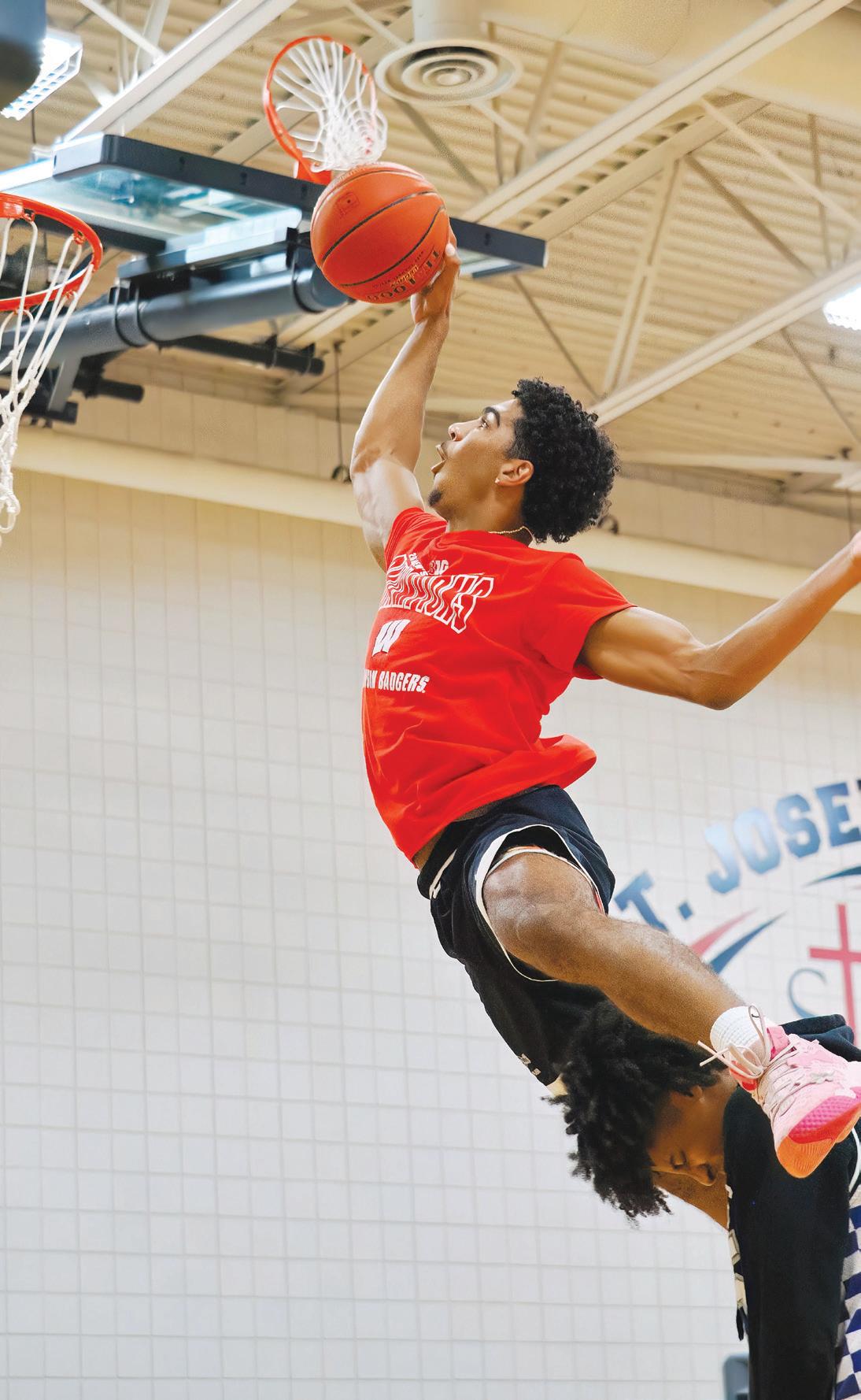
OVERHEARD
It’s obvious (the) importance that farmers have, even small farms, in protecting the environment and also improving their communities. So this is really important legislation.
Ricardo Simmonds, environmental policy adviser at the U.S. Conference of Catholic Bishops, commenting during a Sept. 21 virtual panel on the 2023 Farm Bill being considered by Congress. The discussion was hosted by St. Paul-based Catholic Rural Life.
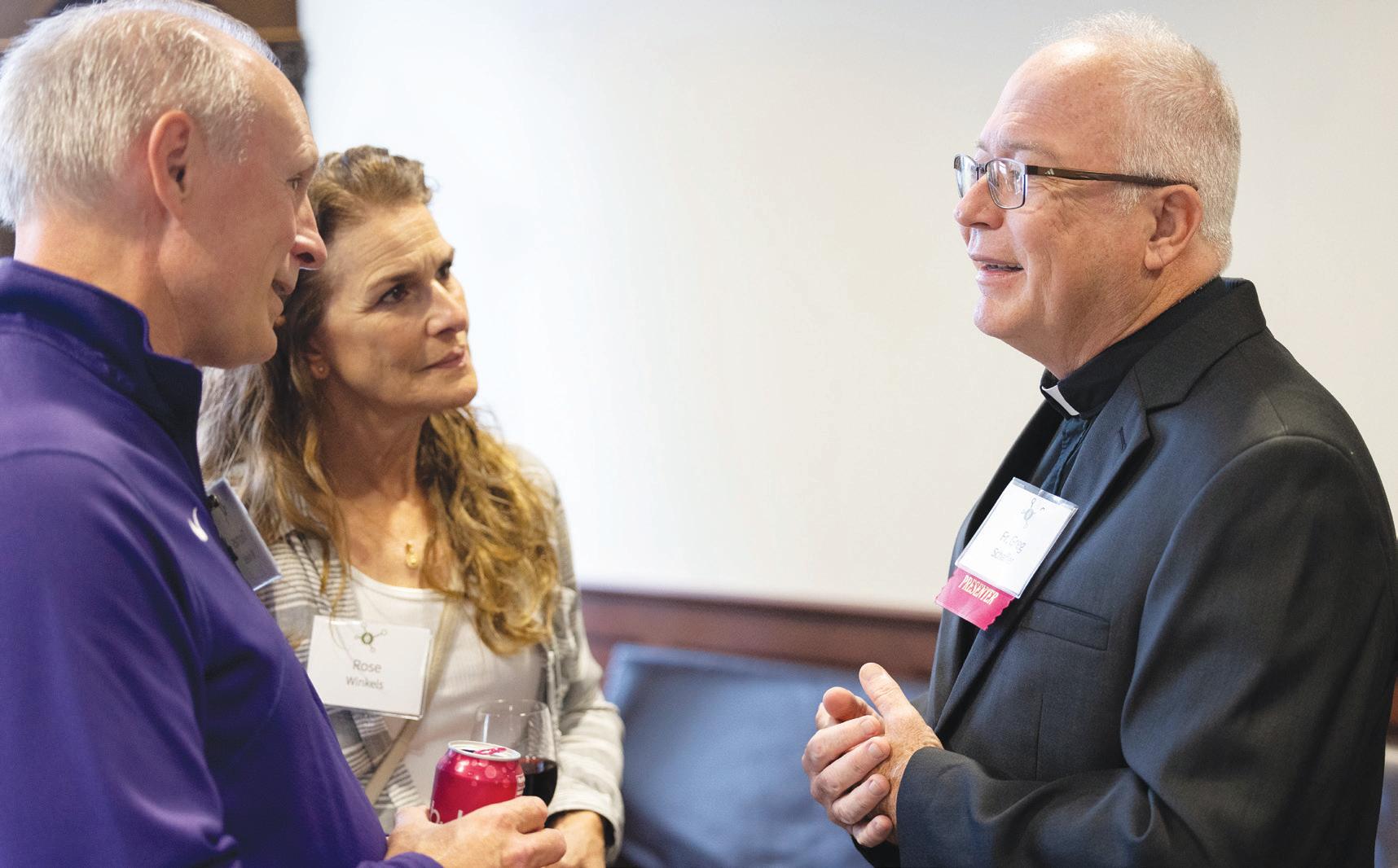
NEWS notes
Brian Bruess was inaugurated Sept. 22 as the first joint president of the College of St. Benedict in St. Joseph and St. John’s University in Collegeville. According to an announcement from the institutions, he is the first person in Minnesota to simultaneously serve as president of two four-year private colleges. Before this position, Bruess was president of St. Norbert College, a Catholic liberal arts school in De Pere, Wisconsin, and had spent 21 years at St. Catherine University in St. Paul, including as its executive vice president and chief operating officer.
A 19-year-old man has been charged in connection with an alleged assault on campus at St. Catherine University in St. Paul. Keanu Labatte, of Granite Falls, has been charged with three counts of first-degree criminal sexual conduct, one count of assault by strangulation and one count of threats of violence in connection with the incident, according to a criminal complaint. The complaint states Labatte arrived on the all-female university’s campus Sept. 7 to visit his girlfriend of two months for the weekend. The woman told police Labatte had found text messages, pictures and social media that angered him. The woman said he took her phone and kept it away from her. She told police she was threatened with a knife and physically and sexually assaulted from Sept. 7 through Sept. 9. Labatte made an initial court appearance on Sept. 12. His next court appearance was scheduled for Oct. 9.
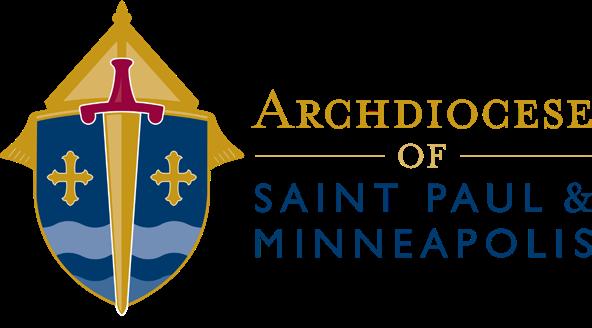
Holy Family Catholic High School in Victoria recently was named a 2023 National Blue Ribbon School by the U.S. Department of Education. Holy Family was one of 36 Catholic schools in the country to be honored, and the only one from Minnesota. “The National Blue Ribbon School speaks volumes about the unwavering dedication of our students, educators, families, and the entire HFCHS community,” said Mike Brennan, president of Holy Family. “It reaffirms our commitment to providing an exceptional educational experience.” Jason Slattery, the Archdiocese of St. Paul and Minneapolis’ director of Catholic education, noted that Catholic schools partner with parents in providing an exceptional education for students. “Today, we congratulate one of our schools, Holy Family Catholic High School in Victoria, for being honored” as a Blue Ribbon School, Slattery said.
The architecture of Providence Academy in Plymouth is featured in the Evangelization & Culture quarterly journal of the Word on Fire Institute led by Bishop Robert Barron of Winona-Rochester. Issue No. 17 focuses on education and includes a 14-page section devoted to photography of the school building along with an article by its headmaster, Todd Flanders. On the institute’s website, wordonfire institute, there is an offer to get a free copy of this issue, while supplies last.
PRACTICING Catholic
On the Sept. 22 “Practicing Catholic” radio show, host Patrick Conley interviewed Father Daniel Griffith, pastor of the Basilica of St. Mary in Minneapolis, and Caitlin Morneau, director of restorative justice at Washington, D.C.-based Catholic Mobilizing Network, who described an upcoming conference on restorative justice and healing. Also featured were Archbishop Bernard Hebda of St. Paul and Minneapolis, who discussed veneration of the saints; and MarySarah Stokman, who described her home-goods store The Olive Branch in St. Paul. Listen to interviews after they have aired at practicingcatholicshow com or anchor fm/practicing-catholic-show with links to streaming platforms.
Materials credited to CNS copyrighted by Catholic News Service. Materials credited to OSV News copyrighted by OSV News. All other materials copyrighted by The Catholic Spirit Newspaper. Subscriptions: $29.95 per year; Senior 1-year: $24.95. To subscribe: (651) 291-4444; To advertise: Display Advertising: (651) 291-4444; Classified Advertising: (651) 290-1631. Published semi-monthly by the Office of Communications, Archdiocese of St. Paul and Minneapolis, 777 Forest St., St. Paul, MN 55106-3857 • (651) 291-4444, FAX (651) 291-4460. Per odicals postage paid at St. Paul, MN, and additional post offices. Postmaster: Send address changes to The Catholic Spirit, 777 Forest St., St.Paul, MN 55106-3857. TheCatholicSpirit.com • email: tcssubscriptions@archspm.org • USPS #093-580 The Catholic Spirit is published semi-monthly for The Archdiocese of Saint Paul and Minneapolis Vol. 28 — No. 18 MOST REVEREND BERNARD A. HEBDA, Publisher TOM HALDEN, Associate Publisher JOE RUFF, Editor-in-Chief REBECCA OMASTIAK, News Editor 2 • THE CATHOLIC SPIRIT SEPTEMBER 28, 2023
DAVE HRBACEK | THE CATHOLIC SPIRIT
COURTESY TREVOR JAGER
ONLY JESUS | FATHER CHARLES LACHOWITZER
Praying twice
FROMTHEVICARGENERAL A
parish was in need of an organist. It was decided that the top applicant should play for a Sunday Mass.
It happened to be “Stewardship Sunday” and the pastor was preaching on sacrificial giving. At the end of the homily, the pastor asked that all those who were able to increase their contribution to please stand, so as to inspire the whole parish. Just then the organist played the “Star Spangled Banner,” and everyone stood up. The organist got the job.
Throughout the past 40 or more years, national studies on church membership and church attendance have identified a parish’s music program as one of the top qualities of a positive experience for Sunday Mass. Many parishes in our archdiocese pay significant attention to the development and quality of liturgical music and expanded cultural styles. Given these national studies, the importance
Orando dos veces
Una parroquia necesitaba un organista. Se decidió que el mejor aspirante debería jugar para un Misa dominical. Resultó ser el “Domingo de Mayordomía” y el pastor estaba predicando sobre el ofrenda sacrificial. Al finalizar la homilía, el párroco pidió que todos aquellos que pudieran aumenten su contribución para por favor ponerse de pie, para inspirar a toda la parroquia. Justo entonces el organista tocó “Star Spangled Banner” y todos se pusieron de pie. El organista consiguió el puesto.
A lo largo de los últimos 40 años o más, los estudios nacionales sobre la membresía de la iglesia y su la asistencia ha identificado el programa de música de una parroquia como una de las
of this effort cannot be overstated.
I readily admit that I do not play a musical instrument, nor can I read music. As a celebrant for Sunday Mass, I am unfortunately a minimalist when it comes to singing the parts of the Mass that I am supposed to sing. After I sing the doxology, I am resigned to the sound of the keyboardist pounding out the correct note so that the choir does not descend into variations of B flat. Once I celebrated Mass in an assisted living center. The person who was supposed to lead the singing didn’t show up, so I had to lead the hymns. After Mass there was a social and a piano player began playing lively tunes. Some people were dancing. One elderly woman invited me to dance with her, but I replied, “I dance like I sing.” To which she replied, “Oh Father, nobody dances that bad!”
Most of us find music to be a source of inspiration, whether sacred music in church or secular music in our cars. Some people even listen to sacred music when they are not in church. Many parishes make
principales cualidades de una comunidad positiva experiencia para la Misa dominical. Muchas parroquias en nuestra arquidiócesis prestan mucha atención a la desarrollo y calidad de la música litúrgica y estilos culturales ampliados. Dados estos estudios, no se puede subestimar la importancia de este esfuerzo.
Admito fácilmente que no toco ningún instrumento musical ni sé leer música. Como celebrante de misa dominical, lamentablemente soy minimalista a la hora de cantar las partes de la Misa que se supone que debo cantar. Después de cantar la doxología, me resigno al sonido de la teclista tocando la nota correcta para que el coro no caiga en variaciones de b bemol. Una vez celebré misa en un centro de vida asistida. La persona que se suponía que debía dirigir el canto no apareció, así que tuve que dirigir los himnos. Después de la Misa hubo
a financial commitment to professional musicians and choir directors. The importance with which people treat music in the liturgy suggests it is an investment worthy of every dime spent. Nonetheless, the participation of the people in the pews gives every traditional hymn or contemporary song of praise an added richness. Even I sing better as one voice among many. For me, nothing stirs the soul so deeply as the sound of the people in the pews singing.
Through the intercession of St. Cecilia, patron of pastoral musicians, may all our organists, keyboardists, instrumentalists, choir directors and choir members continue to inspire us. May they know of our gratitude to God for the gifts they share at Sunday Mass. And may our thanksgiving be truly shown as we raise our voices in faithful singing. As the old saying goes and is regularly attributed to St. Cecilia, “to sing is to pray twice.”
After all, in the life of a parish, when we do Sundays well, the other six days of the week fall into place.
un evento social y el pianista comenzó a tocar melodías animadas. Algunas personas estaban bailando. Una anciana invitada me invitó a bailar con ella, pero le contesté: “Bailo como canto”. A lo que ella respondió: “Oh Padre, ¡Nadie baila tan mal!
La mayoría de nosotros consideramos que la música es una fuente de inspiración, ya sea música sacra en la iglesia o música secular música en nuestros coches. Algunas personas incluso escuchan música sacra cuando no están en la iglesia. Muchos las parroquias asumen un compromiso financiero con músicos y directores de coro profesionales. El la importancia con la que la gente trata la música en la liturgia sugiere que es una inversión digna de cada centavo gastado. Sin embargo, la participación de la gente en los bancos da todo himno tradicional o canto de
alabanza contemporáneo una riqueza añadida. Incluso yo canto mejor como uno voz entre muchos. Para mí, nada conmueve tanto el alma como el sonido de la gente en el bancos cantando.
Por intercesión de Santa Cecilia, patrona de los músicos pastorales, que todos nuestros organistas, teclistas, instrumentistas, directores de coro y miembros del coro continúan inspirándonos. Pueden saben de nuestra gratitud a Dios por los dones que comparten en la Misa dominical. Y que nuestra la acción de gracias se muestre verdaderamente cuando alcemos nuestras voces en cantos fieles. Como dice el viejo refrán y como se atribuye habitualmente a Santa Cecilia, “cantar es orar dos veces”.
Después de todo, en la vida de una parroquia, cuando hacemos bien los domingos, los otros seis días de la semana caen en lugar.
Take leap of faith and dare to love your family, those in need, pope says
By Carol Glatz Catholic News Service
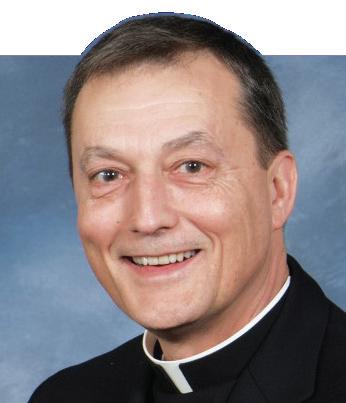
The world and the Catholic Church today need to take a leap forward “in faith, charity and hope,” Pope Francis said in his homily at a late afternoon Mass in Marseille’s open-air stadium.
“We need to rekindle our passion and enthusiasm, to reawaken our desire to commit ourselves to fraternity. We need to once again risk loving our families and dare to love the weakest, and to rediscover in the Gospel the transforming grace that makes life beautiful,” he said at the final event of a two-day trip to the old port city in southern France.
Passion and enthusiasm were not lacking at the Vélodrome Stadium, which erupted into cheers the minute images hit the screens of Pope Francis making his way through the city in the popemobile. Officials estimated 100,000 people lined the route to the stadium while some 50,000 people nearly filled the stadium. French President Emmanuel Macron, Marseille Mayor Benoît Payan and other dignitaries were present.
People chanted “Papa Francesco” and repeatedly executed “the wave” to immense cheers. One section, filled with people wearing blue sports bibs, added to the ocean effect. Then in a well-coordinated pull, volunteers hoisted an immense veil-like cut-out image of a waving pope and the belltower of the city’s Basilica of Notre Dame de la Garde. They also held up gold cards to spell out “Merci” (Thank you) against the blue background.
While the pope’s Sept. 22-23 trip focused on the plight of migrants and the world’s responsibility to rescue those in danger, to create more equitable legal channels for migration, to amend gross economic disparities and promote peace, he also reminded Catholics of their mission to share Christ’s compassion and hope.
In his homily Sept. 23, he asked the faithful to reflect “honestly, from the heart: Do we believe that God is at work in our lives? Do we believe that the Lord, in hidden and often unpredictable ways, acts in history, performs wonders and is working even in our societies that are
marked by worldly secularism and a certain religious indifference?”
In a world with so many challenges, he said, people of faith must have trust in the Lord.
The pope based his reflection on events in sacred Scripture in which God makes possible what seems impossible, generating life even amidst sterility.
The Virgin Mary and her older cousin Elizabeth are both pregnant “in an impossible way,” with Elizabeth feeling her child “leap” in her womb, recognizing the arrival of the Messiah, he said.
This is how to discern “whether or not we have this trust in the Lord,” he said, by feeling this sign, this “leap for joy” within.
“Whoever believes, whoever prays, whoever welcomes the Lord leaps in the Spirit and feels that something is moving within, and ‘dances’ with joy,” the pope said.
This experience is “the opposite of a flat, cold heart, accustomed to the quiet life, which is encased in indifference and becomes impermeable,” he said. “Such a
heart becomes hardened and insensitive to everything and everyone, even to the tragic discarding of human life, which is seen today in the rejection of many immigrants, of countless unborn children and abandoned elderly people.”
“Those who are born to faith, on the other hand, recognize the presence of the Lord,” he said.
“Even in the midst of toil, problems and suffering, each day they discern God’s visitation among us and feel accompanied and sustained by him,” the pope said.
“The experience of faith also compels us to leap toward our neighbor,” he said, and to experience the joy of sharing.
Pope Francis asked Christians to pray for the “fire of the Holy Spirit” and let themselves “be set afire by the questions of our day, by the challenges of the Mediterranean, by the cry of the poor — and by the ‘holy utopias’ of fraternity and peace that wait to be realized.”
“Today, too, our life and the life of the Church, France and Europe need this: the grace of a leap forward, a new leap in faith, charity and hope,” he said.
SEPTEMBER 28, 2023 THE CATHOLIC SPIRIT • 3
SLICEof LIFE
Everyday Christianity: Assets and Obstacles, Directions and Dangers for Living our Faith in Challenging Times by John Carr
“How do we connect worship on Sunday to work on Monday? How is the Gospel proclaimed not only in the pulpits of our parishes, but also in the everyday lives of Catholics? How can we best carry the values of our faith into family life, the market place, and the public square?” ese questions led off the US Catholic Bishops’ reflections on Everyday Christianity 25 years ago. ey are even more urgent today when the stresses on family life have grown, the ethical choices in economic life are more complicated, and the call to pursue the common good in public life is more difficult. John Carr, the founder of the Initiative on Catholic Social ought and Public Life at Georgetown University, will examine the mission of Christians today in our everyday lives; the context for living our faith in our families, work, and society; and offer some directions and dangers for being a disciple of Jesus in our own time and place. He will suggest how the scriptures, the principles of Catholic social teaching, and the message of Pope Francis can offer ways forward.
Brought to you by:














Helmet winner
Bette Wolf, center, an employee of St. Mary of the Lake in Plymouth, holds a Minnesota Vikings football helmet autographed by quarterback Kirk Cousins that she won Sept. 12 in a drawing at the Archdiocesan Catholic Center in St. Paul. That day featured an open house at the ACC for parish staff members to come for tours of the building and to mingle with archdiocesan employees and Archbishop Bernard Hebda and Auxiliary Bishop Michael Izen, left, who drew the winning entry for the Vikings helmet. At right is Bill Lentsch, archdiocesan chief operating officer. Wolf is faith formation director, youth minister, Sunday School and volunteer coordinator at St. Mary of the Lake.
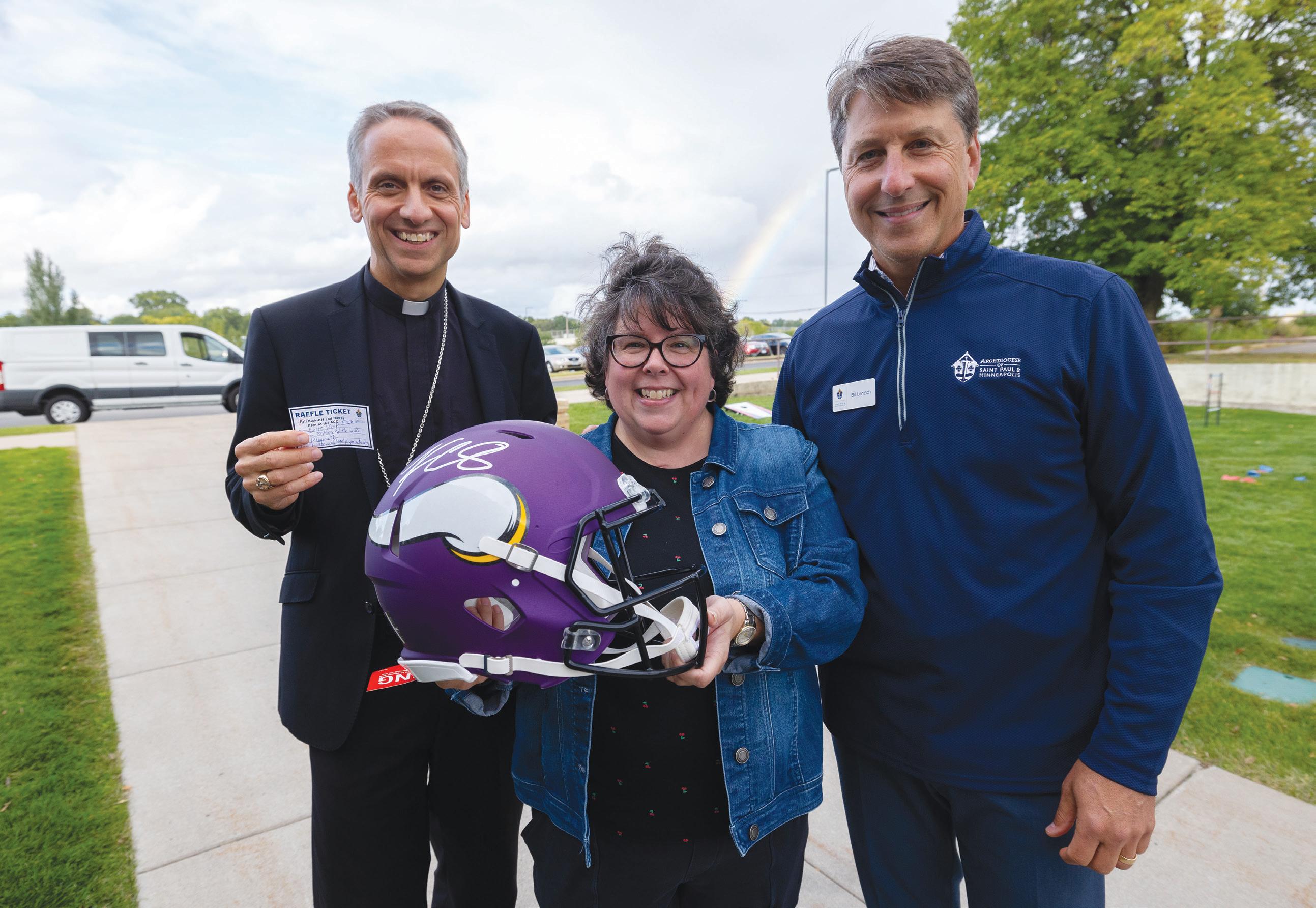
4 • THE CATHOLIC SPIRIT SEPTEMBER 28, 2023 LOCAL
DAVE HRBACEK | THE CATHOLIC SPIRIT
A Special Presentation for the Business Sector
Limited Seating, registration required - no walk-ins: Fee $20 (non-refundable), club parking $10 - cash only www.collegevilleMN.com/theologyday or 320-363-3570
12,
S,
11:30
check-in
12:00-1:30
John Carr is the Founder of the Initiative on Catholic Social ought and Public Life at Georgetown University which shares Catholic social teaching, promotes principled civil dialogue, and reaches out to a new generation of leaders.
Business ursday, October
2023 - e Minneapolis Club, 729 2nd Ave.
Minneapolis
a.m.:
and meal,
p.m.: presentation
Tom and Bonnie Brever
Ernie and Mary Stelzer Dennis and Mary Kay Smid
Mary Lou and Jim Carney
Dan and Lynn Fazendin
Kay Ness
Jasper
The Catholic Community Foundation of Minnesota (CCF) helps Catholics like you create meaningful charitable giving plans. Individuals and families set up charitable funds to give through CCF to support their favorite parishes, schools, and organizations. CCF ensures their charitable giving is taxefficient and aligns with our Catholic faith. Contact CCF to learn how we can help you. 651.389.0300 ccf-mn.org Who is CCF? $
Paul and Connie Schnepf Tom & Mary McKeown
Family Robert L. Lee and Mary E. Schaffner
‘Come and see’
Growing relationships grounded in Christ is key to implementing Archdiocesan Synod
By Joe Ruff The Catholic Spirit
It’s not a program, but it provides structure. It invites people in parishes to come together in natural, faith-filled, friendly formats. And it has the potential to bring Christ’s love more powerfully into a confused and divided world.
That’s the promise and the hope offered by those who are working to help implement year one of Archbishop Bernard Hebda’s pastoral vision for the Archdiocese of St. Paul and Minneapolis.
Spurred by three years of preparation, prayer and listening to parishioners that culminated in a June 2022 Archdiocesan Synod, and propelled by months of careful planning, year one began in July. Activity is growing visibly this fall, with about 72 people and still more in each of the archdiocese’s nearly 200 parishes participating. For seven weeks, they will dive into ways of leading small groups that can foster personal relationships grounded in Christ. They will serve as catalysts for sharing the good news, said Deacon Joseph Michalak, director of the Office of Synod Evangelization.
How will this happen?
“Come and see,” Deacon Michalak urged parish leaders in a video explaining the process, referencing Philip in the Gospel of John inviting a doubting Nathanael to meet Christ.
“Brothers and sisters, we’re running together,” Deacon Michalak said in the video. “My prayer is that together we would see him (Christ) and in love, invite others to come and see as well.”
The invitation and living it out through the model being proposed makes a difference in people’s lives, Deacon Michalak said in an interview. “This way of being parish and reaching out to others is proving to be a concrete answer to the loneliness that we can experience, even in our parishes. And certainly, beyond the parish. It’s a world hungering for relationships.”
Bob Nicholas — a member of Mary, Mother of the Church in Burnsville and a volunteer leader for that parish’s implementation of the Synod — said Archbishop Hebda’s November 2022 post-synodal pastoral letter, “You Will Be My Witnesses: Gathered and Sent From the Upper Room,” makes it clear that everyone has a role in sharing Christ’s promise of salvation. It goes well beyond pastors and parish staff, he said.
“We’re not staff evangelizers,” he said. “Small groups build our parish around a community. Small groups are a way to live as the Church.”
More than 80 parishioners are signed up at Mary, Mother of the Church. More are expected as the parish prepares for an Oct. 2 start to small group formation training, using videos and other materials developed by the archdiocese, Nicholas said. “The harvest is abundant and there is still wheat in the field. We want to keep inviting people.”
Matt Belford — confirmation coordinator, youth ministry, OCIA, baptism and adult faith formation leader at St. Joseph in Miesville — said his parish has teamed with St. Pius V in Cannon Falls to offer the formation for small groups, which is called Parish Evangelization Cell Systems, or PECS.
About 20 people from the rural parishes attended the first session Sept. 19 at St. Pius V, Belford said. “For our size parish, I was pretty pleased,” he said.
One accommodation for those who travel from their farms or nearby towns has been to lengthen the sessions but shrink the number of weeks involved from seven to four, Belford said.
Nadine Friederichs, director of mission at All Saints in Lakeville, said even as her parish’s 12 leaders reached out to at least 72 people, the number interested grew to 110. Three separate sessions of the same teaching are being offered each week. About
25 people attended the first one Saturday, Sept. 16, and about 60 people showed up at a gathering on the same lesson offered on Tuesday evening, Sept. 19, she said.
“I think our team had a good praying and discerning session to reach out to people who have certain pastoral charisms,” Friederichs said, such as hospitality and caretaking. That helped the team reach people who might feel called to take part, she said.
Part of preparation for the 12 parish leaders in each parish was a nearly three-month missionary discipleship formation program capped by a one-day Activated Disciple Seminar May 20 that drew more than 1,500 people to Williams Arena in Minneapolis for Mass, prayer and personal testimonies. Friederichs said she attended and was inspired by one phrase in particular, “holy boldness.” It’s now the theme for All Saints in implementing the Archdiocesan Synod, she said.
“Each of us took bold action to invite people at Masses or among our acquaintances,” she said. “We’re excited that it’s been received so well. We’re trying to keep that energy and the Holy Spirit flowing through them. And have faith that our bishops are leading us through.”
Explaining the process in another preparatory video, Bishop Joseph Williams said some Catholics shy away from the word “evangelization” because it seems imposing. The approach encouraged by Archbishop Hebda through PECS recognizes people’s natural gifts and is easily implemented and adaptable, Bishop Williams said.
“We’re teaching people a way of relational ministry that keeps them within their giftedness,” Bishop Williams said. “The small group is not an end in itself. It is a way, a path of missionary discipleship.”
“These small groups teach people within them a very concrete and intentional path of missionary discipleship,” the bishop said. “How to invite their friends, their neighbors, their coworkers, into a relationship with Jesus Christ, into which the small group can be an instrument that includes prayer, service, sharing our testimony.”
Deacon Michalak explained further in a video:
“Notice that name, ‘evangelizing cell.’ It connotes a cell that grows and multiplies, and it is evangelistic. It’s oriented to gently exposing people to the good news of Jesus Christ, the savior. It is evangelistic, not by knocking on doors, preaching on the street corners like that brave, lonely guy outside Target Field, or handing out flyers, all of which may have their place,” Deacon MIchalak said. “But it is evangelistic, telling the good news, naturally, organically, relationally, through natural relationships in our lives, through family, friends, neighbors, coworkers, fellow Vikings fans in our circle, even fellow parishioners.”
Father James Perkl, pastor of Mary, Mother of the Church, said Archbishop Hebda’s pastoral letter and efforts to implement it already have made a
Deacon Joseph Michalak, director of the Office of Synod Evangelization, discusses sharing Christ’s love with others through parish-based small groups Aug. 28 at Mary, Mother of the Church in Burnsville.
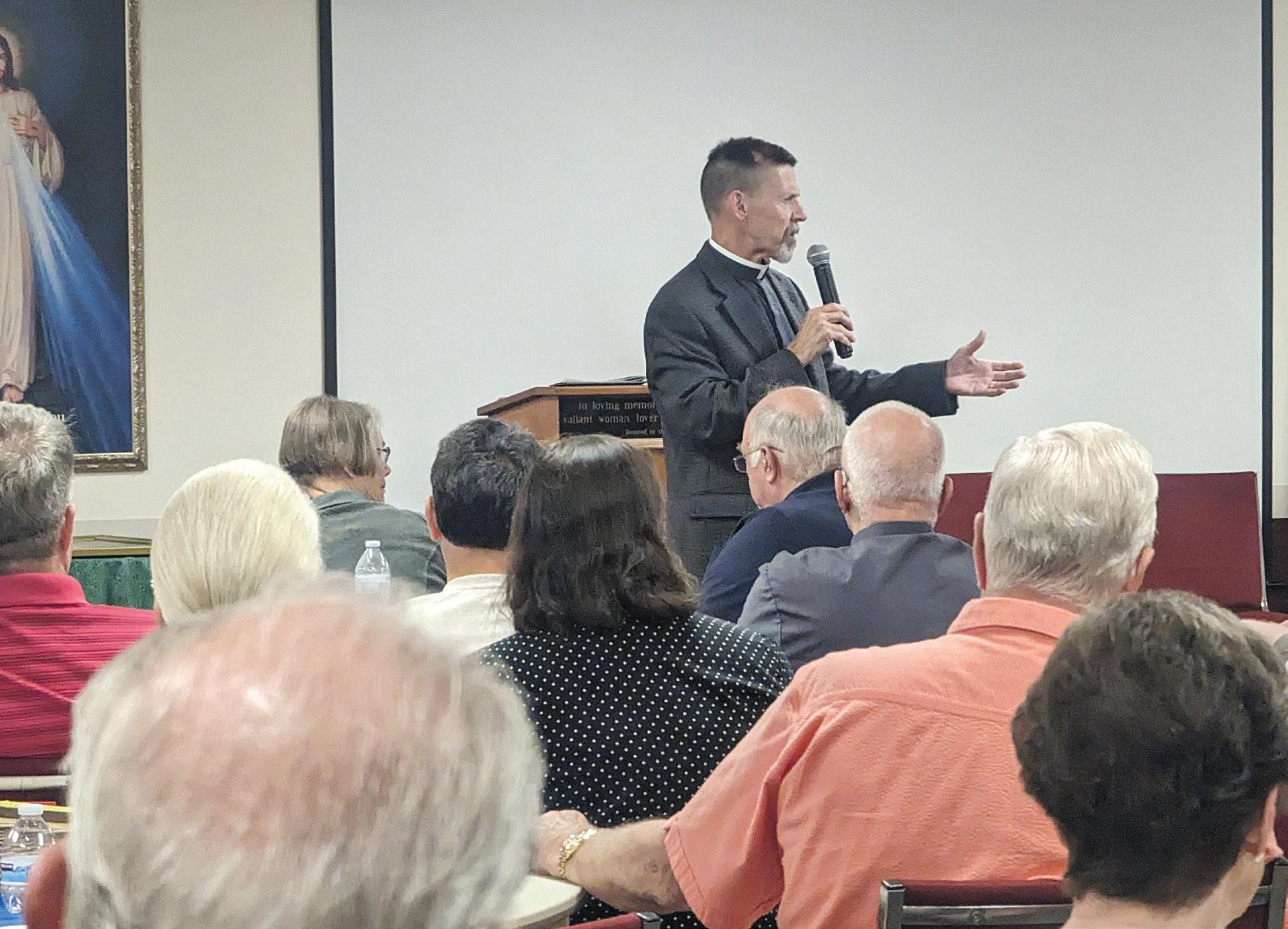
WHAT HAPPENS NOW
uSeptember into November: Small group leader formation.
u�Nov. 11-Dec. 10: Parishes offer a small group practical training session.
uJanuary 2024: Parishes pilot small groups under the Parish Evangelization Cell System.
u��January to early February: Parishioners urged to join small groups starting in Lent 2024.
u�Ash Wednesday, Feb. 14 or sooner: Small groups available to all in parish.
COMPONENTS OF PECS
Seven key elements in the small group model under the Parish Evangelization Cell System. Each meeting lasts 90 minutes.
u�Praising God with songs and prayers.
u�Sharing recent experiences of God and our response to him.
u�Teaching element, content depends on focus of group.
u�Discussing the teaching.
u�Parish announcements.
u�Intercessory prayer for people in and outside the group.
u�Healing, prayer ministry within the group.
THREE FOCUS AREAS
Archbishop Bernard Hebda discerned three focus areas for pastoral life in the Archdiocese of St. Paul and Minneapolis:
1) Forming parishes that are in the service of evangelization.
2) Forming missionary disciples who know Jesus’ love and respond to his call.
3) Forming youth and young adults in and for a Church that is always young.
More than 500 people at the Archdiocesan Synod in June 2022 voted on priorities to begin implementing Archbishop Hebda’s pastoral vision. The archbishop studied, prayed and discerned three for the next three years:
u(July 2023-June 2024) Parish-based small group formation.
u(July 2024-June 2025) The Mass and the Eucharist.
u(July 2025-June 2026) Parents as primary educators of their children in ways of faith.
difference in parish council and other meetings.
“Last night, our parish council was praying for each other, for everybody in our lives,” Father Perkl said. “We’ve come a long way. This isn’t just a business meeting. Already the pastoral letter has made a difference in how we meet and what we pay attention to.”
SEPTEMBER 28, 2023 LOCAL THE CATHOLIC SPIRIT • 5
COURTESY AMY SCHROEDER, MARY MOTHER OF THE CHURCH
Delegate from archdiocese seeks prayers as she prepares for Vatican synod
By Joe Ruff The Catholic Spirit
A delegate to the Oct. 4-29 Synod of Bishops, Cynthia Bailey Manns, said she invites prayers as she prepares to leave for Rome.
“Prayers for good health,” said Bailey Manns, adult learning director at St. Joan of Arc in Minneapolis. “Prayers for patience, prayers for clarity, compassionate empathy, to make sure I’m open.”
Bailey Manns, 65, is one of 10 nonbishop voting delegates chosen by Pope Francis to represent the North American region at the first general assembly of the Vatican synod. She is also one of four laypeople from the United States appointed by Pope Francis. A second synod assembly will be held in October 2024.

Asked if the appointment weighs heavily on her, Bailey Manns said yes and no.
“It’s not heavy in terms of it’s too much responsibility,” she said. “It is intense, and the importance of it. I’ve always been a person who is very comfortable in being one of the few at the very beginning of anything. And so that space is not the piece that challenges me. It’s wanting to make sure that I’m doing this well and that I’m paying attention to God in all of this.”
Bailey Manns will be among more than 450 participants — 363 of whom are voting delegates — with leaders from the Vatican curia and episcopal conferences. More than a quarter of synod members are non-bishops, including laypeople, who for the first time will have a vote during synod deliberations.
She said the fact Pope Francis has included laypeople among those who can vote reflects who he is, “particularly as a Jesuit, and that he wants to not only say what he believes, but he wants action behind it. And we have to be a Church that listens to everybody. We have to be a Church that engages with others, particularly those who are different from us. We can’t say everyone’s made in the likeness and image of God and then put a ‘but’ behind it. And I think this is a way of him saying there is no ‘but’ here.”
The synod is expected to address controversial topics such as leadership roles for women and ministry to
Catholics who identify as LGBTQ+. Bailey Manns said these have been questions that she has faced in parish ministry, and she feels a responsibility at the synod to represent everyone she serves.
“How do I make sure that I am representing not only our congregation, but the different aspects of who we are as a congregation, as a Church, our Catholics of color, our LGBTQ community, our separated and divorced?” she asked. “All the people that I engage with in our parish, and that I have their stories and their dreams and hopes and take those with me and represent them well, and that I continue
PRAYER SERVICE
An “Eve of the Synod” prayer service will be held from 7-8 p.m. Oct. 3 at St. Joan of Arc in Minneapolis and it will be livestreamed. The service is co-sponsored by the parish and Discerning Deacons, a national group that holds a monthly prayer service and in recent months has been praying for the Vatican synod. A link for registration to the livestream can be found at tinyurl com/46ru6d78 Discerning Deacons engages Catholics in active discernment about women and the diaconate.
to steep myself in my own spiritual preparation for this.”
Bailey Manns said she has heard criticism and support for her appointment to the synod. It hasn’t surprised her, she said.
“It is expected for so many reasons,” she said. “I’m a woman, I’m an African American woman. And this is a new space that we have not been in before (as a Church),” she said. “Not everyone is going to be in alignment with what I think and believe, and I accept that.”
Focused and centered prayer runs through the preparatory documents for the synod, and it will be important all the way through, Bailey Manns said.
“They have a wonderful phrase in there, that the protagonist of this is the Holy Spirit,” she said. “And so, how do we all try to embody that in a way that’s compassionate and deliberative and with empathy, and also with a great deal of self-awareness in terms of where our issues are, things that are important to us? And so that is the grounding of it.”
By Maria Wiering OSV News
The eyes of the Catholic world turn to Rome Oct. 4, as the worldwide Synod of Bishops convenes on the feast of St. Francis of Assisi to focus on “synodality” and understanding what it means in terms of “communion, participation and mission” in the Church. Here’s what it is, how we got here and what to expect.
1. The Synod on Synodality is three years in the making.
Pope Francis announced in March 2020 (at the height of the COVID-19 pandemic, especially in Italy) that the next Synod of Bishops would be held in October 2022 on the theme “For a synodal Church: communion, participation and mission,” which quickly became known as the “Synod on Synodality.” In May 2021, he postponed the two-part meeting to 2023 (with a second gathering in 2024), due in part to the pandemic, and announced that it would be preceded by a two-year process.
That decision reflected Pope Francis’ vision for the Synod of Bishops outlined in the 2018 apostolic constitution “Episcopalis Communio,” including what Cardinal Mario Grech, the general secretary for the Synod of Bishops, described at the time as “transforming the synod from an event into a process.” Pope Francis officially opened the “synodal path” with a Mass Oct. 10, 2021, with dioceses around the world following suit.
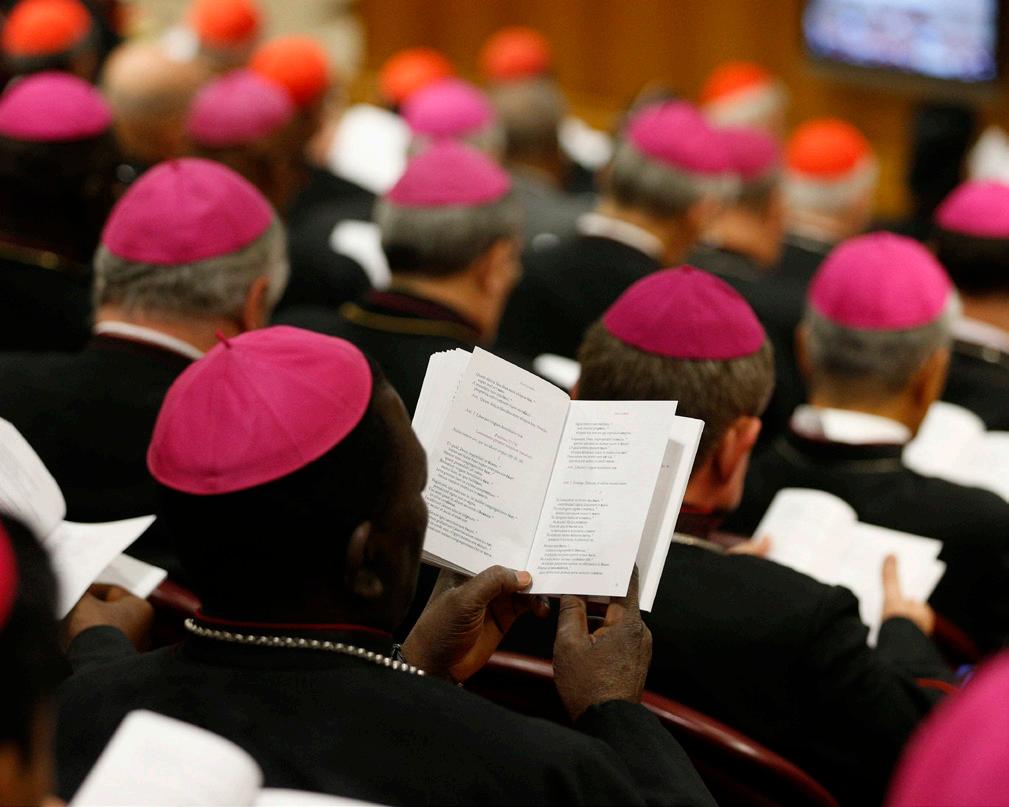
2. Synodality is “the action of the Spirit in the communion of the Body of Christ and in the missionary journey of the People of God.”
Despite the long history of synods in the Church, the term “synodality” is relatively recent, emerging in Church documents about two decades ago. In 2018, the
topic was addressed by the International Theological Commission, which defined it as “the action of the Spirit in the communion of the Body of Christ and in the missionary journey of the People of God.” Synodality was also a topic of conversation at the 15th Ordinary General Assembly of the Synod of Bishops on the theme “Young People, Faith and Vocational Discernment” that took place in 2018.
In the Synod on Synodality’s “vademecum,” an official handbook issued in September 2021, “synodality” is described as “the particular style that qualifies the life and mission of the Church, expressing her nature as the People of God journeying together and gathering in assembly, summoned by the Lord Jesus in the power of the Holy Spirit to proclaim the Gospel,”
adding, “Synodality ought to be expressed in the Church’s ordinary way of living and working.”
In his homily for the Mass opening the synod process, Pope Francis said, “Celebrating a synod means walking on the same road, walking together.” He said that when meeting others, Jesus would “encounter, listen and discern,” and those verbs “characterize the synod.”
“The Gospels frequently show us Jesus ‘on a journey’; he walks alongside people and listens to the questions and concerns lurking in their hearts,” he said. “He shows us that God is not found in neat and orderly places, distant from reality, but walks ever at our side. He meets us where we are, on the often-rocky roads of life.” He continued: “Today, as we begin this synodal process, let us begin by asking ourselves — all of us, pope, bishops, priests, religious and laity — whether we, the Christian community, embody this ‘style’ of God, who travels the paths of history and shares in the life of humanity. Are we prepared for the adventure of this journey? Or are we fearful of the unknown, preferring to take refuge in the usual excuses: ‘It’s useless’ or ‘We’ve always done it this way’?”
3. A synod is a meeting of bishops. It has ancient roots in the Catholic Church’s history and continuity in the Eastern Churches. The modern Synod of Bishops was instituted near the end of Vatican II.
“Synod” has been historically interchangeable with “council,” such as the churchwide Council of Nicea or the Council of Trent, or more localized meetings, such as the Plenary Councils of Baltimore, which brought the U.S. bishops together in 1852, 1866 and 1884. The late Jesuit Father John O’Malley, a theologian at Georgetown
6 • THE CATHOLIC SPIRIT LOCAL SEPTEMBER 28, 2023
DAVE HRBACEK | THE CATHOLIC SPIRIT Cynthia Bailey Manns seeks prayers as she prepares to leave for Rome to be a delegate at the Synod of Bishops in October.
PLEASE SEE SYNODALITY ON NEXT PAGE
10 things to know about October’s Synod on Synodality in Rome
NEWS FILE PHOTO | PAUL HARING, CNS
Bishops pray at the start of a session of the Synod of Bishops at the Vatican Oct. 9, 2018. OSV
SYNODALITY
CONTINUED FROM PREVIOUS PAGE
University, noted in a February 2022 essay for America magazine that local councils declined in use following the First Vatican Council, which defined papal primacy, but they didn’t die out: “One of the first things that the future Pope John XXIII did when he became patriarch of Venice was to call a diocesan synod,” he wrote.
The idea for a permanent bishops’ council surfaced during the Second Vatican Council, and in 1965 St. Paul VI established the Synod of Bishops with “the function of providing information and offering advice.” “It can also enjoy the power of making decisions when such power is conferred upon it by the Roman Pontiff; in this case, it belongs to him to ratify the decisions of the Synod,” St. Paul VI wrote.
4. The Synod on Synodality is the 16th Ordinary Synod since the global Synod of Bishops’ institution.
Three extraordinary general assemblies have also been held, including in 2014 to complete the work of the 2015 ordinary general assembly on the family. An additional 11 special Synods of Bishops have been held to address issues facing a particular region. Among them was a special synod on America in 1997 and one on the Amazon region in 2019. Synods have regularly resulted in the pope, who serves as the synod president, writing a post-synodal apostolic exhortation.
5. Preparations for the Synod on Synodality sought to be the most extensive ever, with an invitation to every Catholic to provide input.
An unprecedented worldwide consultation occurred at the diocesan/ national and continental levels. The synod’s two-year preparation process invited all Catholics worldwide to identify areas where the church needed to give greater attention and discernment. That feedback was gathered and synthesized by dioceses and then episcopal conferences, before being brought to the continental level. The syntheses from episcopal conferences and continental-level meetings were shared with the Holy See, and they informed a working document known as an “Instrumentum Laboris” for the general assembly’s first session. The document’s authors describe it as “not a document of the Holy See, but of the whole Church.” However, the U.S. Conference of Catholic Bishops’ report indicates that only about 700,000 Catholics in the U.S. participated, representing just over 1% of of the 66.8 million U.S. Catholics.
6. The Synod on Synodality’s twopart question.
According to the vademecum, “The current Synodal Process we are undertaking is guided by a fundamental question: How does this ‘journeying together’ take place today on different levels (from the local level to the universal one), allowing the Church to proclaim the Gospel? and what steps is the Spirit inviting us to take in order to grow as a synodal Church?”
The working document released in June to guide general assembly participants includes many other reflection questions; but it particularly asks participants to reflect on these priorities, guided by its focus on
communion, participation and mission: “How can we be more fully a sign and instrument of union with God and of the unity of all humanity?”; “How can we better share gifts and tasks in the service of the Gospel?”; and “What processes, structures and institutions are needed in a missionary synodal church?”
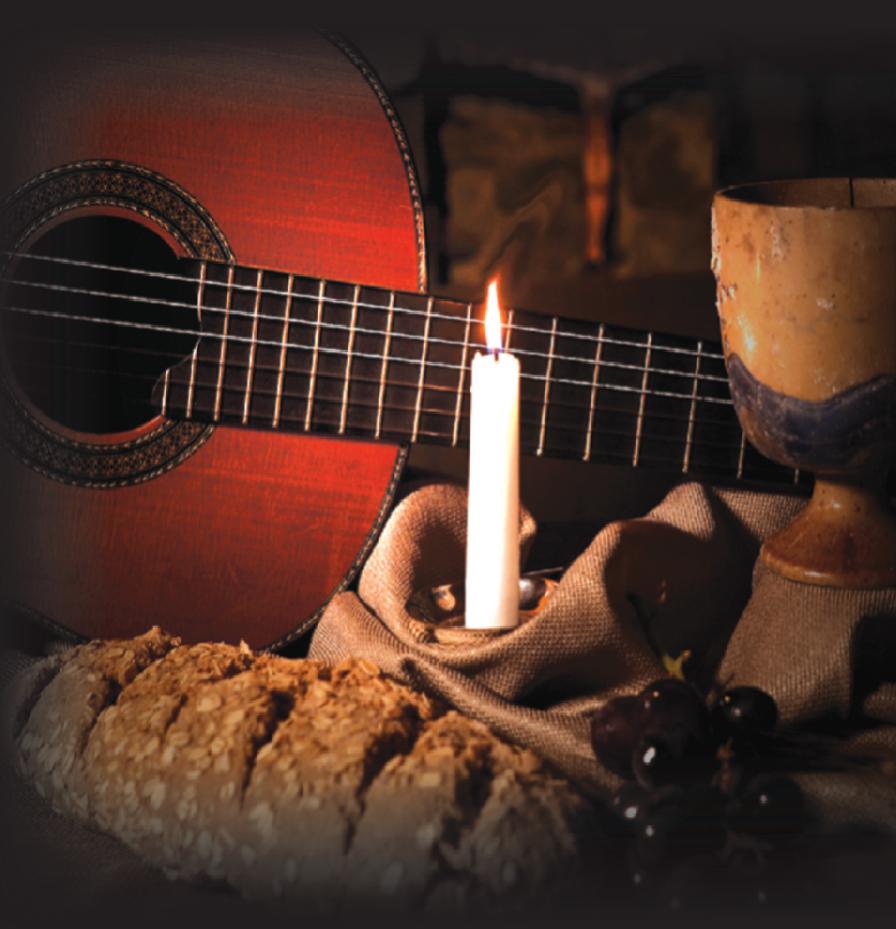
7. For the first time ever, non-bishops — including lay men and women — have a vote in the synod.
The synod’s general assembly includes more than 450 participants — 363 of whom are voting members — with leaders from the Vatican curia and episcopal conferences. More than a quarter of synod members are non-bishops, including laypeople, who for the first time will have a vote during synod deliberations. A deliberate effort was made to include women and young adults. As of July 7, when the Vatican released the initial list, the number of voting women was the same as participating cardinals: 54. The list was subject to change ahead of the synod, organizers said.
In previous synods, some non-bishop participants held the non-voting role of “auditor,” which has been eliminated at this assembly, although some attendees will be non-voting observers, called “special envoys,” or non-voting facilitators or advisers.
The presence of “non-bishops,” according to Cardinal Jean-Claude Hollerich, the synod’s general relator, in a letter published at the time the change was announced, “ensures the dialogue between the prophecy of the people of God and the discernment of the pastors.”
8. More than 20 Catholics from the United States have been invited to participate.
Participating American bishops chosen by Pope Francis are Cardinal Blase Cupich of Chicago, Cardinal Wilton Gregory of Washington, Archbishop Paul Etienne of Seattle, Cardinal Seán O’Malley of Boston and Cardinal Robert McElroy of San Diego, California.
Additional bishop-delegates selected by the USCCB and confirmed by Pope Francis are Bishop Daniel Flores of Brownsville, Texas; Cardinal Timothy Dolan of New York; Bishop Robert Barron of Winona-Rochester, Minnesota; Bishop Kevin Rhoades of Fort Wayne-South Bend, Indiana; and Archbishop Timothy Broglio, who leads the U.S. Archdiocese for the Military Services, and serves as USCCB president.
American prelates Cardinal Joseph Tobin of Newark, New Jersey, and Cardinal Kevin Farrell, formerly the bishop of Dallas, are also delegates by nature of prior papal appointments. Cardinal Tobin is an ordinary member of the Synod of Bishops and Cardinal Farrell is prefect of the Dicastery for the Laity, Family and Life.
Pope Francis also nominated synod member Jesuit Father James Martin, editor-at-large for America magazine and founder of Outreach, a ministry for Catholics who identify as LGBTQ+.
Other U.S. delegates were nominated by the USCCB and confirmed by the pope. They include: Richard Coll, the executive director of the USCCB’s Department of Justice, Peace and Integral Human Development; Cynthia Bailey Manns, director of adult faith formation at St. Joan of Arc in Minneapolis; Father Iván Montelongo of El Paso, Texas; Wyatt Olivas, a student at the University of Wyoming in Laramie, Wyoming;
Julia Oseka, a Polish student at St. Joseph’s University in Philadelphia; and Sister Leticia Salazar, a member of the Company of Mary, Our Lady and chancellor of the Diocese of San Bernardino, California.
USCCB-nominated delegates participated in the continental synod, and Coll, Bishop Flores and Sister Salazar were members of the 18-person North American Synod Team that prepared the North American continental synod report for the U.S. and Canada. Bishop Flores has been named one of nine delegate presidents of the assembly.
Sister Maria Cimperman, a member of the Society of the Sacred Heart and theologian at Catholic Theological Union in Chicago, and American Jesuit Father David McCallum, executive director of the Discerning Leadership Program in Rome, are among 57 non-voting experts.
9. In the U.S., the meeting has been a source of great expectation and great apprehension.
The synod has inspired both great praise and deep criticism for its approach, including allowing laypeople to vote; its subject matter, which includes controversial topics such as leadership roles for women, ministry to Catholics who identify as LGBTQ+, and the relationship between laypeople and clergy. At least one cardinal expressed concern that the meeting could lead to confusion and error in Church teaching.
However, Bishop Flores, speaking recently with OSV News, said the meeting aims to better understand people’s reality so it can better minister to them. “We can’t respond with the Gospel if we don’t know what the reality
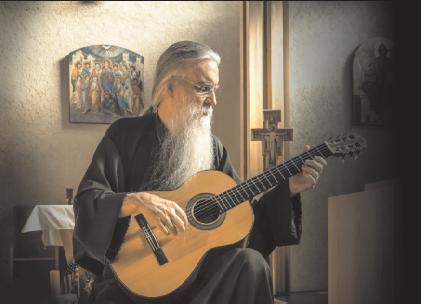
they’re facing is,” he said of people, especially those on the margins and in difficult situations.
10. October’s meeting is just the beginning.
In an unusual move, the synod general assembly has been divided into two sessions, with the first Oct. 4-29, and the second planned for October 2024. The decision, announced in October 2022, has parallels to the Synod of Bishops on the Family, which met in 2014 for an extraordinary general assembly of the Synod of Bishops, and then continued its work the following year as an ordinary assembly. The work of both meetings culminated in the post-synodal apostolic exhortation “Amoris Laetitia” (“The Joy of Love”), released in 2016.
Prior to the synod, Pope Francis presides over an ecumenical prayer vigil in St. Peter’s Square Sept. 30. Synod participants attend a retreat Sept. 30-Oct. 3 in Sacrofano, about 16 miles north of Rome. The retreat includes morning meditations — offered by Dominican Father Timothy Radcliffe of the United Kingdom and the Benedictine Rev. Mother Maria Ignazia Angelini of Italy — afternoon small groups and Mass.
Meanwhile, the Taizé community and other organizations have organized a meeting in Rome that weekend called “Together — Gathering of the People of God” for young people to pray for the synod.
The synod’s general assembly opens Oct. 4 with a papal Mass that includes the new cardinals created at a Sept. 30 consistory. Among them is expected to be Archbishop Christophe Pierre, apostolic nuncio to the United States.
Book & Companion CD from
The Lord’s Supper
SEPTEMBER 28, 2023 LOCAL THE CATHOLIC SPIRIT • 7
New
“John Michael Talbot offers a precious gift that will deepen and enliven our understanding of the Mass ”
Most Reverend Gar y W Janak, J C L , Auxiliar y Bishop, Archdiocese of San Antonio’
A E u c h a r i s t i c R e v i v a l Book A d o r a t i o n C D
Price for Bundle: $35 (Free Shipping) To order go to: www.JohnMichaelTalbot.com
John Michael Talbot - Legendary Christian Musician, Author and Monastic Founder whose music has been the soundtrack of the faith journey of millions throughout the world.
Two parishes host separate series on Second Vatican Council
By Rebecca Omastiak The Catholic Spirit
Two parishes in the Archdiocese of St. Paul and Minneapolis are separately hosting a series on the Second Vatican Council — a concurrence that the pastor of one of the parishes said “must have been the Spirit moving.”
Held from 1962 to 1965, Vatican II consisted of four sessions; each session was approximately three months. Convened by St. John XXIII, the council produced 16 documents related to the life of the Church.
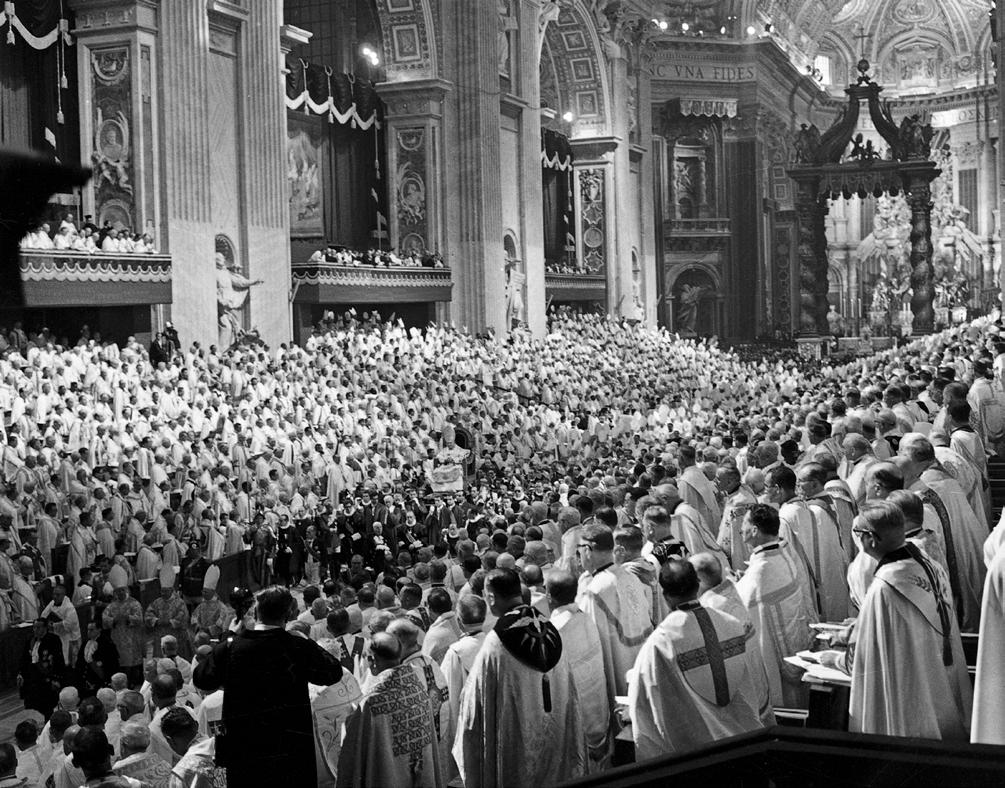
At St. Victoria in Victoria, the “Vatican II Documents in a Year” series seeks to respond to Pope Francis’ encouragement for the Church to “rediscover the council’s passion and renew our own passion for the council,” an announcement from the parish stated. With the “beautiful” success of “The Bible in a Year” and “The Catechism in a Year” podcast programs, Father Bob White, St. Victoria pastor, said the question of “what can we do in a year?” arose.
The focus landed on Vatican II documents, which Father White said “are so important to who we are as a Church, and the direction in which we’re moving.” Deacon Ray Ortman, who has helped organize the series, said inspiration also came from “the evident focus by Pope Francis on trying to renew interest in the teachings and the pastoral implications of the Second Vatican Council.”
As the worldwide Synod of Bishops convenes next month, Deacon Ortman said “it appears ... Pope Francis has in mind some of the inspiration he draws from the spirit of the Second Vatican Council.”
With that, Deacon Ortman said “it just seems like a beautiful time to remind the faithful of the riches of this approach. Even though (Vatican II) is 60 years old, it’s still a fresh approach and really the key to how the Church sees herself in the modern world and her role in it.”
Series speakers will discuss the relevance of Vatican II
documents to the modern Church, Father White explained.
“This is maybe a revisit for some people or maybe for others ... it’s an introduction to rich documents that have shaped our Church and where we’re headed for the future; how do we as a Church respond to the world today?” Father White said.

Deacon Ortman said he views this series as “sort of a treasure hunt, only in this case it’s not buried treasure; it’s treasure that’s hiding in the open. Maybe we haven’t thought of it lately either as being there or even as being treasured, but we hope that we can excite in people an interest in doing a little treasure hunting to see what gems of the faith and of our rich tradition are not only available but accessible and that we can celebrate together.”
The monthly series starts on Sept. 30 and runs through June 29. Each session will be held from 9-11:15 a.m. in Elstan Hall. Registration is not required. More

UST kicks off year three of its Chapel Arts Series
By Barb Umberger The Catholic Spirit


The Chapel Arts Series at the University of St. Thomas in St. Paul returns this fall for a third season.


A series of eight performances, four per semester, will offer a wide variety of programming featuring musicians from the United States and “throughout the world,” said Jacob Benda, director of music, liturgy and sacred arts at St. Thomas.
The series’ goal is to offer the St. Thomas and broader community “exposure to the sacred arts and to the transcendentals of truth, beauty and goodness through art, whether it be through music or visual art,” Benda said. Attendees can expect to “experience beauty as it pertains to music, to visual arts and to dialogue.”
Some music to be performed is directly inspired by holy Scripture, Benda said, “and sometimes we’ll have music that has nothing to do with Scripture, but it’s so beautiful in itself that it may activate a spiritual response from the listener,” he said.
All performances are free and open to the public. Each takes place in the Chapel of St. Thomas Aquinas on the St. Paul campus, followed by a reception in the Hoedeman Gallery of Sacred Art.
The series kicks off Oct. 7 with an “Organ Spectacular” and features international concert organist Raúl Prieto Ramirez performing a range of
information can be found online: stvictoria net/vaticanii-documents-in-a-year

Meanwhile, a separate Vatican II series at St. Mary of the Lake in White Bear Lake is underway.
Sister Mary Kerber, director of mission for the parish, helped organize the series based on the response to a parish-wide survey that indicated “the need for more adult education, including the need to understand Vatican II,” she said.
“Many of us have not had any catechesis since we’ve received the sacraments,” Sister Mary said. “And Vatican II presents us with a deepened understanding of the Church as it reflected on the roots of Christianity — to me, it (the series) connects very closely with what’s happening in the Synod on Synodality.”
Sister Mary reflected on how the Catholic Church “is not just a Church of the hierarchy, it’s a Church of all of us, as our baptism calls each of us to actively participate.”
With all that in mind, she began developing a series schedule based on what she saw as “the most foundational topics in Vatican II.” Those topics include liturgy, morality, ecclesiology and the Church’s social mission, among others.
Kicking off the series was a discussion Sept. 13 called “Vatican II and Liturgy.” Sister Mary said an estimated 50 people attended; she said even “if only 10 people showed up, that is 10 more people who have heard the presentation, and this in itself has power to transform.”
Sister Mary encouraged those interested in attending the series “to come and discover the why of Vatican II and rediscover yourself within the ever-emerging understanding of Church.” She added each session is standalone, so attendees don’t have to worry about missed material.
The six-part series at St. Mary of the Lake runs through Feb. 21. Each session will be held from 6:30-8 p.m. in the St. Joseph Room. Registration is not required. More information can be found online: tinyurl com/5att47z8
compositions from Bach, Liszt, Modest Mussorgsky and Freddie Mercury.
Two world-class Russian pianists will present a two-piano concert at the second performance Oct. 28. The third concert, “Echoes of the Divine,” on Nov. 11, will be “a dialogue between Jewish and Christian music traditions,” Benda said.
This season’s performances also feature collaboration with organizations and institutions across the Twin Cities. For example, the Dec. 9 concert, last of the fall semester, includes the 60-voice choir from the Basilica of St. Mary in Minneapolis. An Advent-focused program, it will also feature a string quartet, choir, piano and organ. Benda will play piano.
“The music will be centered on two pieces that are based on text by St. John of the Cross, his ‘Dark Night of the Soul,’” Benda said. “We’re selecting music that plays with that concept of light and darkness.”
The performance line-up and music selections “stem from his Catholic faith” and were “inspired by the musical and theological riches of the Catholic Church,” Benda said. “My hope is that our events will speak to all people, no matter their background, and it is my sincere belief that anyone who experiences beauty is brought into dialogue with the author of beauty itself.”
The performances suit “anyone who appreciates beauty,” but Benda hopes they attract a significant number of students from St. Thomas and neighboring universities. “I think students in this day and age need to be exposed to beauty and truth and goodness just to help them be wellrounded individuals and to help them grow,” he said.
To view more details on the performances, visit St. Thomas’ website, stthomas edu
SEPTEMBER 12, 2023 LOCAL THE CATHOLIC SPIRIT • 8 NOW PLAYING! “IT SINGS, IT MOVES, IT REALLY ROCKS!” – AP 952.934.1525 ChanhassenDT.com Come join the fun! Church of the Holy Name Fall Festival Sunday, October 15, 2023 10:00 – 4:00 (Masses at 8:30 and 11:00) 37th and 12th Avenue South, Minneapolis 55407 See Calendar of Parish Events for more info or contact us at 612-724-5465 www.churchoftheholyname.org
Festival Catholic Headlines in Your Inbox! Stay up to date with our eNewsletter Subscribe online at TheCatholicSpirit.com
Fall
CNS PHOTO | L’OSSERVATORE ROMANO Pope John XXIII leads the opening session of the Second Vatican
uU.S. Border Patrol records a sharp increase in arrests; the situation of migrants in Mexico deteriorates. A surge in migration through Mexico during the month of September has provoked a “migratory crisis,” according to Catholics who are working with migrants, as shelters strain to handle increasing flows of people heading for the U.S. border — with even more continuing to pour into the country from points south. “We’re experiencing a new migration crisis, a new humanitarian crisis,” Scalabrinian Father Julio López, executive secretary of the Mexican bishops’ human mobility ministry, told OSV News. “The southern border is saturated. The north is saturated. Mexico City is saturated. The spaces that most welcome migrants are the Catholic Church’s spaces and we’re overwhelmed,” he said. “Mexico has turned into an ordeal for the transit of migrants and refugees. Robberies, extortion, kidnappings, forced disappearances and grave human rights violations continue,” the bishops’ human mobility ministry said in a Sept. 22 statement marking World Day of Migrants and Refugees. “Our priority, as the church, is preserving and defending human rights, and always being willing to welcome, protect, promote and integrate all persons, migrants and refugees, without distinction and without leaving anyone on the outside,” Bishop Guadalupe Torres Campos of Ciudad Juárez, head of the human mobility ministry, said in a Sept. 24 letter. Reports from Central America point to a continued flow of migrants heading toward the border with Mexico.
uU.S. Catholic archbishop receives an award from Ukraine’s Zelenskyy. Metropolitan Archbishop Borys Gudziak of the Ukrainian Catholic Archeparchy of Philadelphia received the Cross of Ivan Mazepa from Ukraine’s President Volodymyr Zelenskyy Sept. 21 at the National Archives in Washington. Zelenskyy visited the U.S. capital for meetings after addressing the United Nations General Assembly in New York Sept. 19. Established in 2009, the award honors individuals who have made “significant personal contribution to strengthening interstate cooperation, support of state sovereignty and territorial integrity of Ukraine, and popularization of the Ukrainian state in the world,” according to a press release from the Ukrainian Greek Catholic Church. Ukrainian first lady Olena Zelenska said at the ceremony that the U.S.-born archbishop, who is the son of Ukrainian immigrants, “is known to thousands of Ukrainians — soldiers, displaced persons, and many others whom he helps, and young people who, thanks to him, get a great education.” A trained historian who holds a doctorate in Slavic and Byzantine cultural history from Harvard University, he is president of Ukrainian Catholic University, which has become
2023
a model for Ukrainian higher education, scholarship, disability awareness, human rights advocacy and social innovation. It is “civil society in Ukraine” who “truly deserves recognition,” the archbishop said. “Only God can fathom the depths of their merit.”
u�Biden establishes first White House Office of Gun Violence Prevention. President Joe Biden is establishing the first White House Office of Gun Violence Prevention and has named Vice President Kamala Harris to oversee it, the White House said Sept. 21. The White House said the new office will focus on implementing existing legislation and possible executive action, including the Bipartisan Safer Communities Act signed by Biden, “to end the scourge of gun violence in America.” In a statement, Biden said, “Every time I’ve met with families impacted by gun violence as they mourn their loved ones, and I’ve met with so many throughout the country, they all have the same message for their elected officials: ‘do something.’” Mass shooting events in the United States have become more common in recent years. Lawmakers passed the Bipartisan Safer Communities Act last year, but additional measures, like those sought by Biden and the U.S. bishops — including a ban on military-style semi-automatic rifles, shotguns and pistols fed by ammunition magazines of various capacities — are unlikely to pass a divided Congress.
u�Rallies across Canada draw thousands for and against gender ideology in schools. Hundreds of parents, grandparents, kids and parental rights activists participating in the “1 Million March 4 Children” stood in front of the Harry Hays Building in downtown Calgary Sept. 20, brandishing signs declaring, “Leave our kids alone” and “Education, not indoctrination.” Across the street, a smaller horde of counter-protesters stood under a Pride flag and placards with messages like “Trans kids matter.” The physical distance separating the dueling sidewalk protests — with a significant police presence in between — was roughly 30 steps, but the ideological expanse between these two sides is as wide as Canada itself. Hands off Our Kids, a grassroots movement against what it considers LGBT classroom indoctrination and originally founded by Muslim parents, played a key role in spearheading demonstrations in front of parliament buildings or municipal landmarks in several Canadian cities the same day. Other prominent groups joined the effort, including Campaign Life Coalition, the national pro-life and pro-family organization. The effort originated to support school policies that require young people to have parental consent before changing their first names and pronouns.
• Branson, MO Queen Esther Nov 30 Dec 3
2024

• Guadalupe MEX (Fr. Omar) Feb 16 23
• Ireland Pub/Pew (Fr. Peter/Fr. Popp) April 2 12 Optional Scotland extension April 12 15



• Sold out Holy Land (Fr. Fitz/Fr. Clinton) April 11 22
• Holy land pre or post Petra Jordan ext. April 22 24
• New Holy Land (Fr. Fitz/Fr. Clinton) April 24 May 5
• Eucharistic Revival/IN (St. Cloud Diocese) July 17 21
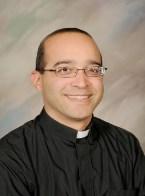
• Poland October
• CA Mission/Wineries (Fr. Binsfeld) October 2025
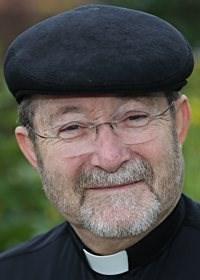
• Italy Jubilee Year (Fr. Fitz) Mar 31 April 10
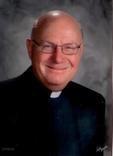
www.jericochristianjourneys.com

u�Numerous Catholic groups join a sea of protesters in New York march against fossil fuels. In what is thought to have been the largest climate change rally since 2019, an estimated crowd of as many as 75,000 demonstrators from some 700 organizations and activist groups paraded through the streets of New York City Sept. 17 in the “March to End Fossil Fuels.” Colorful banners, flags, and placards — some professionally printed, some handmade, but all urging immediate change — accompanied the sea of protesters as they processed through midtown Manhattan. Among them were numerous Catholic groups — including Catholic Climate Covenant; Laudato Si’ Movement; Metro NY Catholic Climate Movement; Altagracia; Pax Christi; Franciscan Action Network; Sisters of Charity; Sisters of Mercy; and Iona University students — contributing their voices to a growing chorus of global alarm that has been energized by the witness of Pope Francis’ outspoken climate declarations. On Oct. 4 — the feast of St. Francis, the patron saint of ecology — the pontiff will release a follow-up to his landmark 2015 environmental encyclical, “Laudato Si’.” Scheduled to closely coincide with the United Nations’ Sept. 20 “Climate Ambition Summit,” the March to End Fossil Fuels aimed to capture the attention not just of American politicians — and, in particular, President Joe Biden — but also world leaders descending upon the U.N.’s New York headquarters for the summit.
u� A federal appeals court on Sept. 13 found that a public school district in California must reinstate a Christian student group. The dispute arose as the club asked its leaders to embrace their core religious beliefs, and the district alleged it discriminated against LGBTQ+ students. The 9th U.S. Circuit Court of Appeals ruled in a 9-2 decision that the San Jose Unified School District likely violated the Fellowship of Christian Athletes’ First Amendment right to free exercise of religion when it revoked FCA’s status as a recognized high school student club. According to court documents, as part of FCA’s Christian Character and Mission requirements, student leaders must also conform to FCA’s Sexual Purity Statement, which states that “God desires His children to lead pure lives of holiness,” and that “the appropriate place for sexual expression is in the context of a marriage relationship. The biblical description of marriage is one man and one woman in a lifelong commitment.” A lower court previously found that the requirement discriminated against LGBTQ+ students, which the appeals court overturned.
— CNS and OSV News
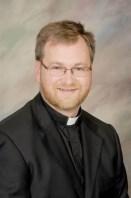
N O T I C E Look for The Catholic Spirit advertising insert from PROLIFE ACROSS AMERICA in all copies of this issue. SEPTEMBER 28, 2023 THE CATHOLIC SPIRIT • 9 NATION+WORLD
Fr. Fitz
1 877 453 7426
Fr. Clinton
Fr. Peter
Fr. Popp
Fr. Binsfeld
Fr. Omar
HEADLINES
Findingfaith on the farm
Catholic family running one of four remaining dairy farms in Hennepin County relies on God, each other
By Barb Umberger The Catholic Spirit
“Any time a calf is born is like Christmas morning,” said Quinci Schmidt, who lives in Buffalo about an hour west of the Twin Cities and grew up on a farm near Rogers. “It’s always so exciting and it never gets old.”
Schmidt, 29, has seen — or narrowly missed — these births many times growing up on the dairy farm owned by her parents, John and Staci Scherber, parishioners of Mary, Queen of Peace in Rogers.
Schmidt and her husband, Luke — they married last fall — are parishioners of St. Francis Xavier in Buffalo. It’s a 20-minute drive from their house each day to the Scherber family farm, where Schmidt helps care for the family’s 100 dairy cows. Luke works full time in Bayport.
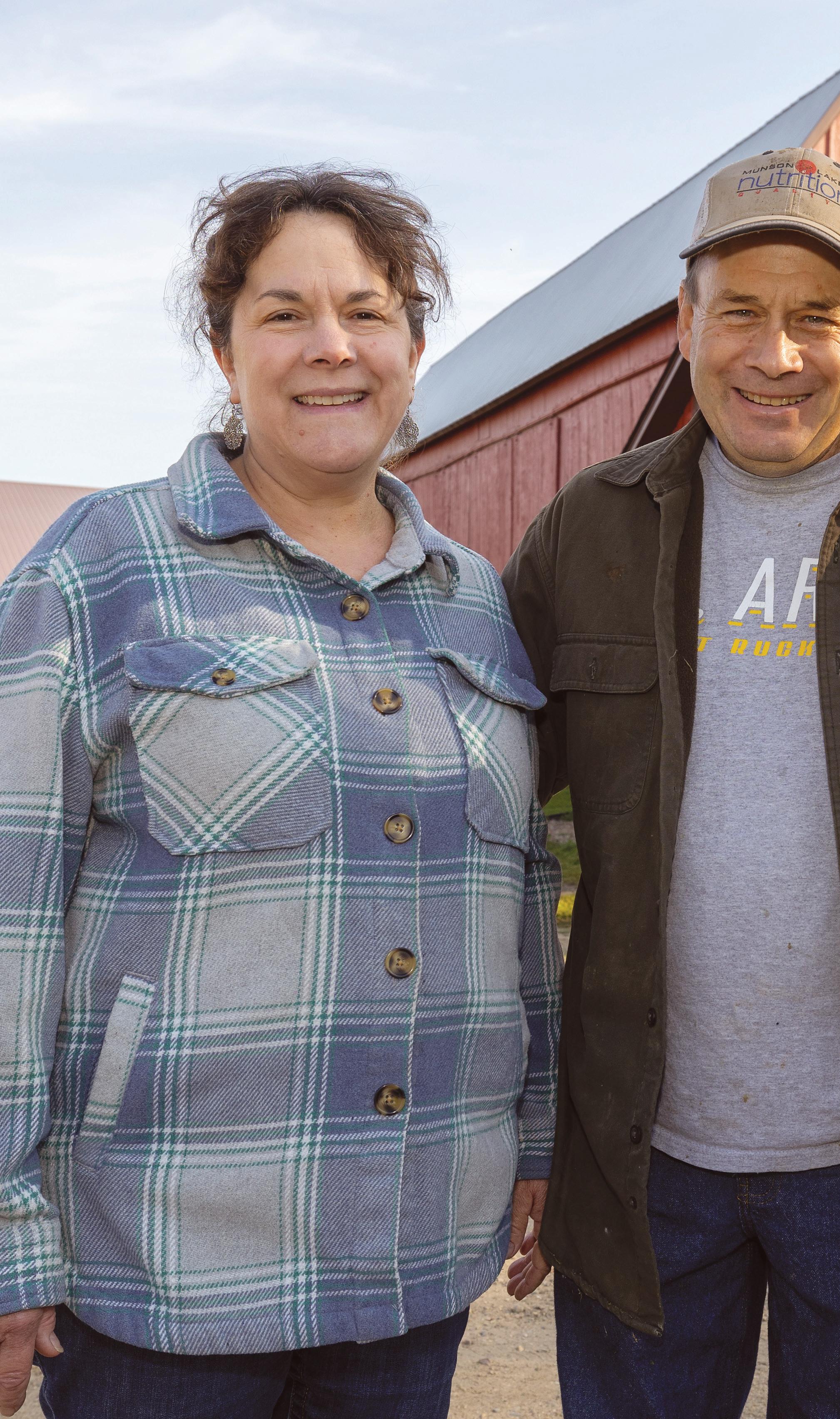
Schmidt said moments on the farm, like “the way a cow looked at me that was so sweet,” are ones she savors; they are moments that bring her closer to her faith, and she reminds herself to “let those things … speak every day.”
The Scherber family is among many across the Archdiocese of St. Paul and Minneapolis who tend livestock and grow crops to feed people worldwide. And the Catholic Church is there, including special formation for seminarians at The St. Paul Seminary in St. Paul and St. Paul-based Catholic Rural Life and its ministerial and advocacy programs (see page 12).
‘Big, friendly giants’
The Scherber family farm is one of four dairy farms left in Hennepin County, John Scherber said. In addition to caring for the dairy cows, the family grows alfalfa, corn and oats — all are used to feed the cows.
Schmidt described the family’s Holsteins as “big, friendly giants” and “just so innocent.”
“They make life enjoyable, and every day is different,” she said. “You try to keep a routine, but there’s always different projects.” If some equipment breaks down or an animal is not doing well, that becomes the day’s focus, she said.
Daily, Schmidt cares for the cows by feeding them, helping with milking, assisting when calves are born and tracking vital information on a computer in the barn’s office — with most data gathered by a robotic milking system the family has used for about two years.
Dairy farmers work with another life all the time, and help them give birth, Schmidt said. The cows and other animals depend on farmers for food and care, but God gave them life, she said.
She may be a steward caring for each cow, Schmidt said, but God is doing the same for her.
Returning to the farm
Schmidt credits her parents with fostering her faith and providing examples.
She recalled the family “trying to pray the rosary every day after dinner or after milking.” For Advent, the family read “some type of preparation story,” she said. And for Lent, “we would always have some sort of campaign, acts of kindness … and (we) made Lenten resolutions as a family,” she said.
“I definitely think my faith has always made me who I am,” Schmidt said. “It’s always part of my activity, how I make decisions, how I think about a situation,” she said. “It kind of imbues my eyesight,” in seeing a situation.
“God’s there and he is always with me,” she said.
Schmidt is the fourth oldest of 10. Her two oldest brothers, Jerek and Dain, are priests in the Congregation of the Legionaries of Christ. Ordained in Rome in 2019, Father Jerek Scherber ministers in Canada, and Father Dain Scherber, ordained in Rome in 2022, serves in Africa while also continuing studies in Rome, their mother said. Before team sports kicked in for the older children, the family ate meals together and said prayers before and after.
The Scherbers’ oldest children started in a public school but when the oldest was in fifth grade, they switched to Catholic schools.
“I think that really helped inform their minds to start thinking, ‘What does God want from me?’ Versus ‘what do I want to do in this world?’ I think they all started thinking, ‘What does God want from me? What is God calling me to do?’” Staci Scherber said.
Schmidt attended Catholic grade school at then-Cedarcrest Academy in Maple Grove (now Ave Maria Academy) and grades 9-12 at Immaculate Conception Academy in Cranston, Rhode Island. She completed three semesters at Mater Ecclesiae College in Greenville, Rhode Island, followed by studying dairy science at the University of Wisconsin-River Falls.
She spent six years discerning consecrated life while at school in Rhode Island. While there, time was set aside for saying the rosary and an hour for meditation was built into the schedule, as was Mass. “Your whole day is (having time), that nothing else matters and you pray,” she said.
“I’ve always tried to be open to whatever God wanted,” Schmidt said. While discerning, God “very distinctly called me to married life,” she said, so she returned to Minnesota. When she came home she saw that her parents’ responsibilities were first to each other, and to their children.
While growing up, her parents influenced her in making faith a priority, she said, with daily living their faith, how they loved each other and their children, and their joy and their peace in life.
Schmidt said she also learned from her
siblings, and wherever she has gone, she has been blessed with “very amazing friends.”
Schmidt worked as a nanny and a receptionist before working full time on the family farm. She enjoys her work now and would like to take over the farm someday, perhaps with one of her brothers.
For Schmidt and her priest-brothers, she said, “we just found that personal relationship with Christ — that he was a person, and he was asking (for) a relationship with each one of us.” For her, the relationship was “coming back home through married life,” she said. For her brothers, it was the priesthood.
Christ asks everyone for a personal relationship, Schmidt said. “And everyone is designed to be holy,” which is different for each person, she said. “For me, it’s through my husband, and for my brothers, it’s through the priesthood. I think it’s just that deep personal love for the person of Christ that motivates them and allows them to see where he’s leading them.”
Finding God in nature
“It’s hard to farm and not have faith, because so much of your life depends on what’s given to you by God,” Schmidt said, including weather and animals. On the farm, there is no time to spend an hour or three to forget everything and pray, Schmidt said.
“But that’s where building and making prayer so much that it’s just automatic,” wake up and, throughout there’ and I’m conversing through his eyes. It’s just and that’s what we’re meant fostering that prayer life,” Prayer needn’t be words, “just lifting your mind and in what you’re doing.” God in the chapel or church, going to talk to you when And sometimes that’s in Schmidt described allowing crickets to … fill me with mornings walking on fresh and it’s letting those simple up your heart, because that’s finding ways to speak to you.”
Schmidt said the story like what she has experienced. “was trying to talk to God,” instead experienced an earthquake, winds and fire. But then that God spoke to him,” moment with the eternal, things kind of speak every conscious decision to not kind of roll over me.”
Schmidt’s mother said
10 • SEPTEMBER 28, 2023 RURALPARISH
Standing near the barns of their dairy farm near Rogers are from left, Staci and John Scherber
building that interior life, much of who you are, she said. “When I throughout my day, it’s a ‘God’s conversing with him or seeing just a part of who you are meant to do, I think, in life,” she said. words, Schmidt said, but and your heart to God God won’t always speak Schmidt said. “He’s when your heart is ready. nature.”
allowing “the sound of the peace” and silent winter fresh snow. “It’s so peaceful simple little moments light that’s God,” she said. “He’s you.”
story in 1 Kings 19:11-13 is experienced. When Elijah God,” Schmidt said, he earthquake, strong “it was in a little breeze she said. “That was a eternal, and just letting those every day and making the not let the mundane just
she believes the farm
helped build the family’s faith life “because you really rely on God.”
“You have to because so much is out of your control,” Staci Scherber said. “It helps you learn to grow in that faith and hope and trust.”
Schmidt’s father said he often prays when he rides the tractor. “You’re just with your own thoughts, you have that quiet time and you’re out in the open field and pray another rosary or just have that time to talk to God,” John Scherber said. “You’re looking at all the nature around you, creation, and it kind of leads you to think of God. You see how much bigger everything is than you.”
Working the land helps build gratitude for the opportunity to do so, he said.
Citing a favorite quote by the character Gandalf in “The Hobbit” — “It is the small, everyday deeds of ordinary folk that keep the darkness at bay” — Schmidt said that applies to her work in farming.
“I’m not out there serving the poor in whatever country. You’re called to just love God and love the people in your life right now, just by being holy, just by being kind and being humble,” she said. “And it’s those little things, in choosing good every day, that is the act of heroism.”
Those little acts will lead to bigger acts, Schmidt said. “You’ve got to be able to say yes in the small things every single day because
that’s the real test. It might be easier to (say) yes when you’re in a heroic moment, but it’s the every single day act that’s leading, that’s forming your heart, and it’s keeping the evil at bay, because it’s that little act of kindness that’s going to change somebody else’s heart or that’s
A detailed computer program helps Schmidt track the daily patterns and activities of the dairy cows, including things like milk production.
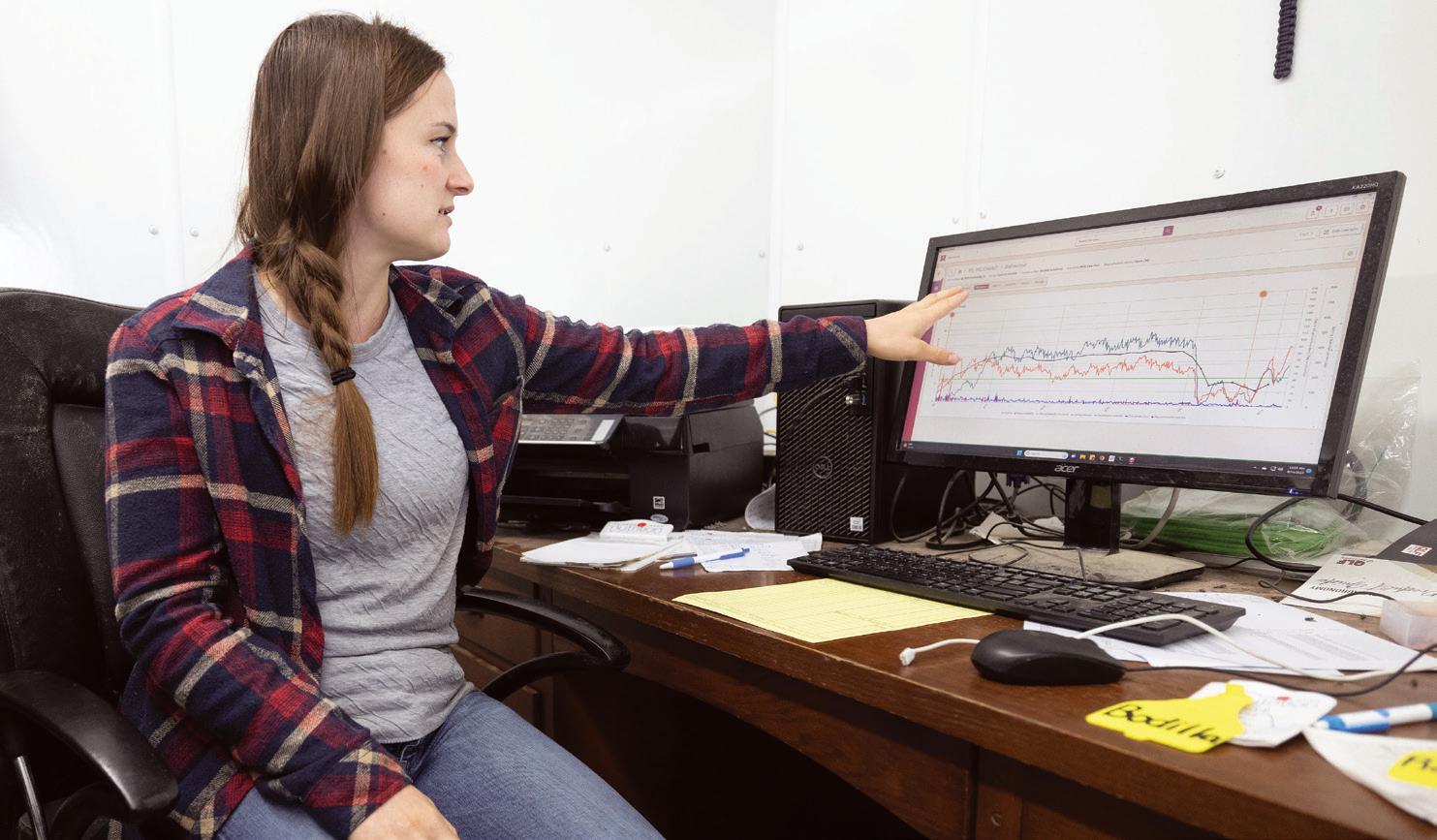
Schmidt takes a few moments to spend time with young Holsteins in the barn. She said, “Any time a calf is born is like Christmas morning.”
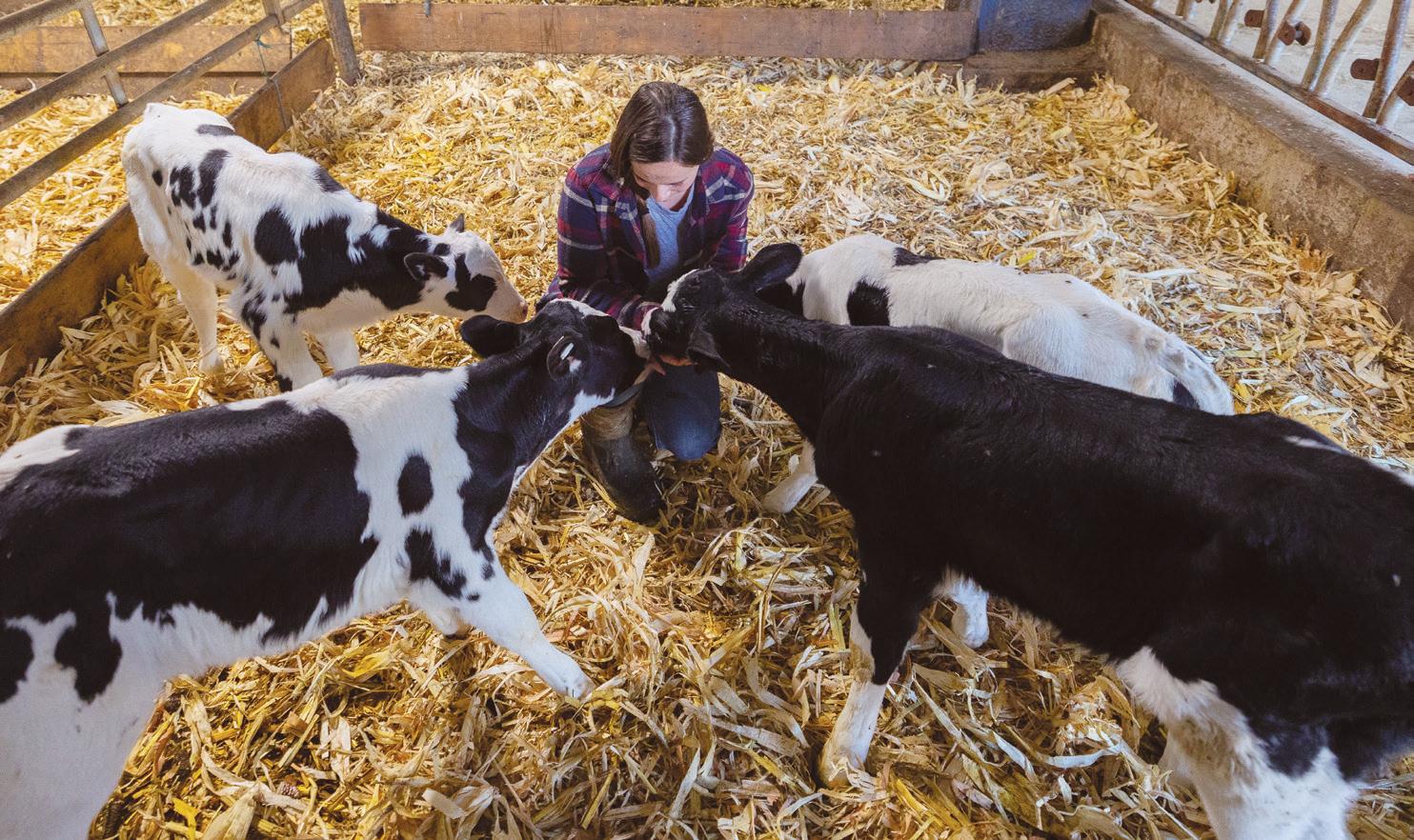
a little win for the day,” she said.
“That’s what God calls us Catholics and Christians to do,” she said, make “little yeses” every day “because that’s what is showing him that we’re using our free will to choose him in the end.”
COWS ARE THE BOSS
Quinci Schmidt’s father, John Scherber, said he remembers when he was young his father would use buckets to milk cows two at a time.
About two years ago, the family added two robotic milking stations in its newer, “free-style barn,” which allows the farm’s 100 Holsteins to walk to a milking station day or night, find a feed mixture at the front of the station and “milk themselves,” he said.
The back of the station closes when a cow enters, and robotic equipment begins washing and sanitizing the cow’s udders before attaching milking equipment and collecting it in a sterile glass container.
Data about each cow is transmitted to Schmidt’s office computer in real time, including current weight, amount of food eaten and amount of milk produced. Besides learning exact amounts of milk being produced, Schmidt can also see changes day to day that could indicate a cow is ailing and might need veterinary care.
With Schmidt and her father the main farmhands, the robotic system also allows them to operate as a family farm, “so we can do it and not be burnt out,” Schmidt said.
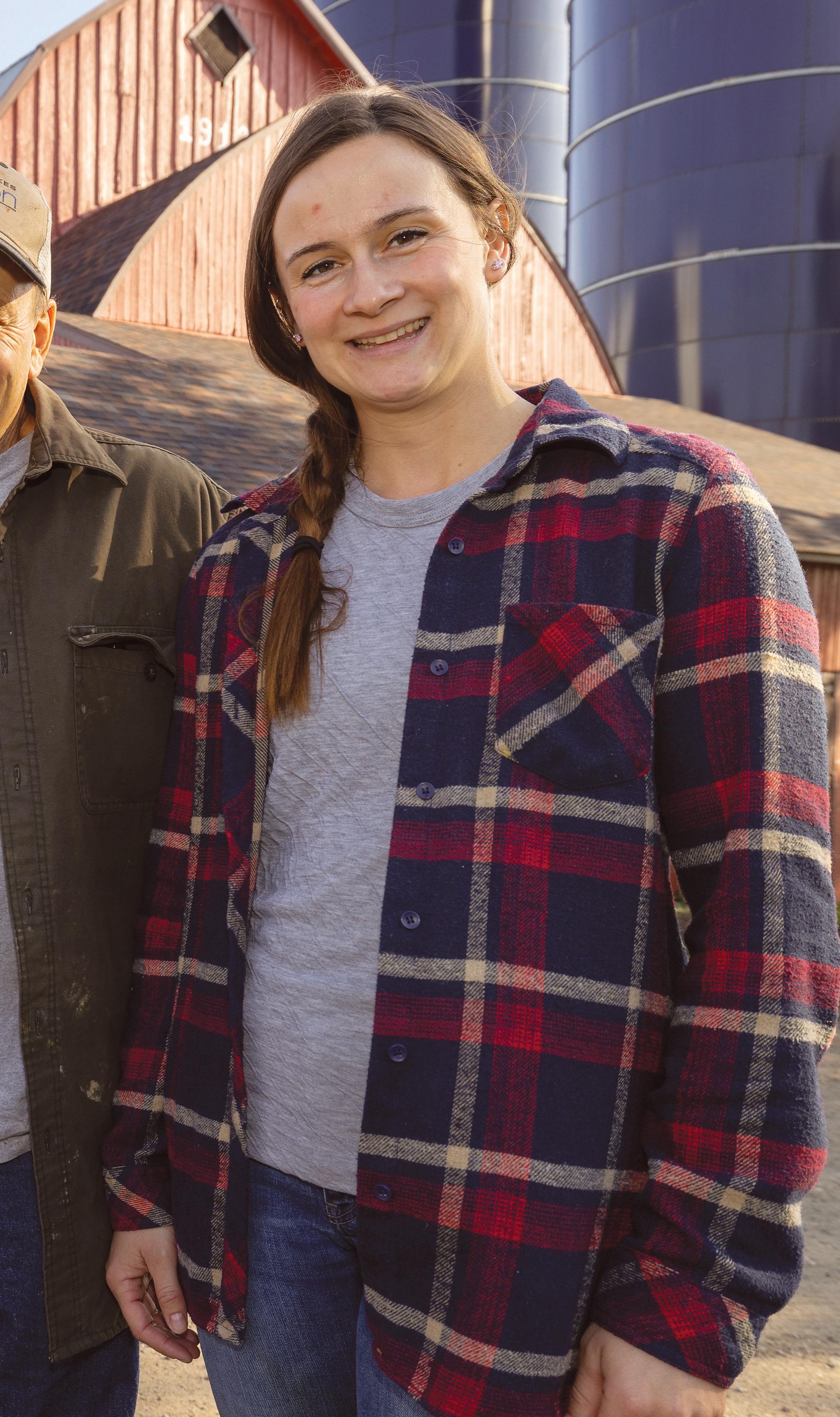
Scherber raised his 10 children to know that the cows “are the boss,” Schmidt said. She remembers, as a child, she and her younger siblings picking up apples in the backyard and throwing them over the fence “because we had some cows in the backyard,” she said. “We would yell, ‘Come, boss,’” she said.
She asked her father once why that was the call. Her father told her the cows are the boss. “They’re the ones that are feeding the world,” he said. “They’re the ones that, technically, we’re working for.”
Other dairy farmers feel and act the same way, she said, respecting the animal, always being kind and gentle to the cows and other animals, showing appreciation.
THE CATHOLIC SPIRIT • 11 PARISHLIFE
PHOTOS BY DAVE HRBACEK | THE CATHOLIC SPIRIT Scherber and their daughter, Quinci Schmidt.
Rural ministry: ‘Love your people’
By Barb Umberger The Catholic Spirit
Father Stan Mader, pastor of St. Joseph in Waconia, grew up on a farm and said he always enjoyed having that part of his life.
Having also ministered in rural parishes in the Archdiocese of St. Paul and Minneapolis, Father Mader now shares his rural life experience with seminarians to help prepare them for future ministry in smaller communities out in the country.
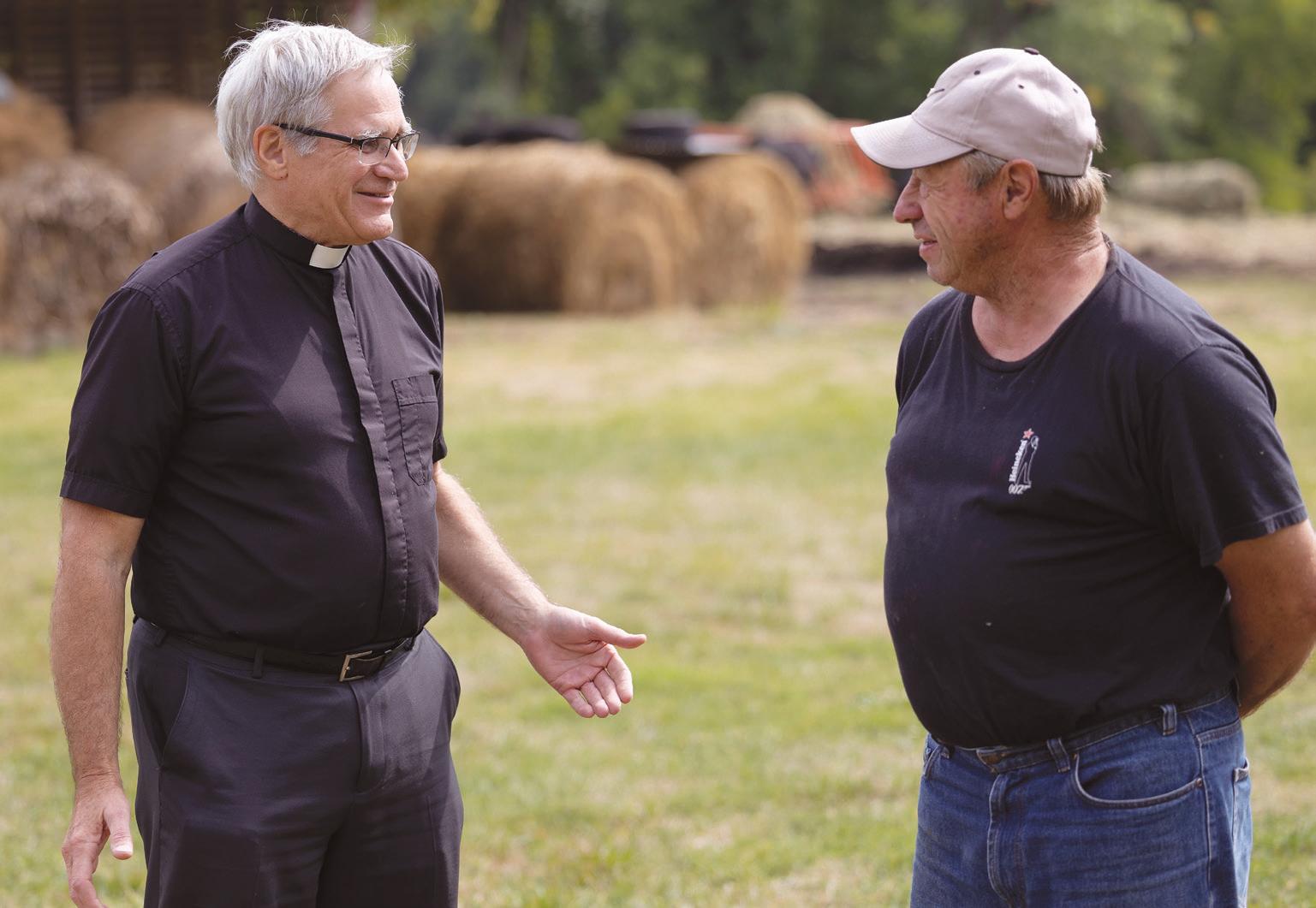
People in a small, rural parish might not have a pastor to themselves, Father Mader said. Years back, he served three archdiocesan parishes at the same time: St. John the Baptist in Vermillion, St. Mary in New Trier and St. Mathias in Hampton. All together, the three parishes included about 650 households, he said.
From there, Father Mader moved to St. Ambrose in Woodbury, which had more than 3,400 people, he said. Yet “life isn’t a whole lot different from the pastor’s point of view,” he said.
When he was serving the three rural parishes, Father Mader and the pastor at the time of nearby St. Joseph in Miesville and St. Pius V in Cannon Falls noticed their parishes had some overlapping Mass times. So, they cut some Masses, still giving parishioners a choice in times to attend. Parishioners, meanwhile, would simply bring the collection envelope for their own parish to whichever Mass they attended, and the money would be properly distributed for them.
The two priests also used their parishes’ proximity to host a community event that a small parish likely couldn’t host on its own. That was the case when Father Mader was ministering in Vermillion, New Trier and Hampton.
“We called it the All Saints Music Festival,” Father Mader said. “We would hire a band that no single (parish) could afford and then promoted it and had people from all over the area come,” he said. The joint event also promoted working together and bringing communities together, he said.
Father Mader has offered words of wisdom on rural parish life to seminarians each August, during a weeklong “Rural Ministry Practicum” course for Theology II seminarians at The St. Paul Seminary in St. Paul. The course is offered in conjunction with St. Paulbased Catholic Rural Life (CRL).
The practicum includes classroom time and a day trip to a local farm so seminarians “learn first-hand the challenges and opportunities of rural ministry,” according to the seminary. Classroom time focuses on “Catholic social teaching as it relates to agriculture, rural communities and creation,” according to CRL.
Father Mader’s suggestions, gleaned over the years and shared with seminarians, include the importance of knowing the history of the town where they are ministering. Know “what has happened there, who are the old names in the town or the church,” he said. “It’s probably almost one and the same.”
Learn local “death stories,” Father Mader has advised seminarians. Be aware of which families experienced a
death by drowning, a farm accident or a home destroyed by a tornado, he said. “Such experiences etch things into that community.”
He recalled serving a small parish when a young man was struck by a car and killed while walking home late at night. “There must have been 60 or 80 young people at the trauma hospital” and over three hours, “we got them all in to see him one last time,” Father Mader said.
“There was just a closeness with the pastor, with me, with that whole bunch of people,” he said.
“One of the great things” when serving a small congregation is the ability to get to know people beyond their name — “really get to know them,” Father Mader said. “That’s
something lovely.”
Father Mader also encourages a pastor assigned to a rural area to “do some ride-alongs” with farmers in their combines “because you will be amazed at what these people have to know these days to be a farmer,” from markets to equipment to challenges of starting or continuing in farming and how to remain a small farmer in a corporate world. Father Mader said he suggests asking families where their harvest goes — whether it’s stored on the farm, taken to a grain elevator, or loaded onto trucks immediately upon harvesting and taken to a port of call.
“That’s one way to get to know your parishioners,” he said. Ask parishioners what it’s like to be a parent, about their dreams and
TIGHT-KNIT PARISH
Father John Meyer, pastor of St. Timothy in Maple Lake for 11 years, said some parish families go back six generations. He might see a great-grandparent, grandparent and parent at church on the same day, “all the way down to the 2-year-old who was just baptized,” he said.
Some parishioners at the parish in Wright County in the northwest metro are farmers, but a number of professionals and tradespeople also fill the pews. “It’s kind of a wonderful mix,” Father Meyer said.
One blessing of ministering at the parish for Father Meyer is the chance to be immersed in the community, getting to know people and families, and spend time with them in different ways. Beyond church, he might see “half the parish” at sporting events, and often sees parishioners at local restaurants and other venues.
“It’s just a blessing that way,” he said.
Jen Rasset, her husband, Phil, and their two children, ages 9 and 10, are St. Timothy parishioners. The children attend the parish school.
The Rassets live north of town, a spot which Jen said is “definitely out in the country.” But it takes her only about seven minutes to drive her kids to school “depending on how long our one stoplight takes to get through.”
The family lives on the back 40 acres of Phil’s “old farm,” she said, property he bought years ago. The couple operated a dairy farm south of town when they first married.
Living outside of town suits her family, said Jen, 40. Her husband likes to hunt and the family has a large garden, this year with beans, peas, cucumbers, potatoes, tomatoes, carrots, lettuce, radishes, corn and pumpkins. The family — as other families do — sells many of the pumpkins at an event in early October to raise money for the school.
Jen’s family has attended St. Timothy since the early 1900s, and she has lectored there since 10th grade. Her parents are extraordinary ministers of holy Communion. She attended the parish grade school, as did her father, and now her children, the third generation.
Many parishioners have a long history at the parish, Jen said, but it has “lots of new families,” too. “We’re a very involved parish, and I think welcoming,” she said.
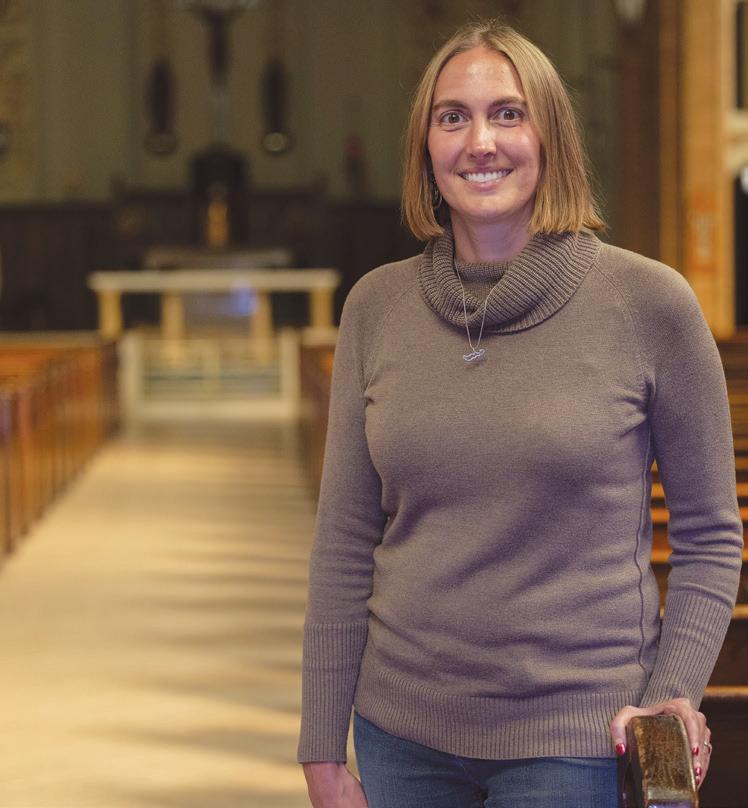
“It’s a family,” Jen said of her parish. “Family cheers each other on and is there for each other.”
— Barb Umberger
concerns, and how they got into the business of farming and its challenges, Father Mader said. “Show up at the (grain) elevator. You’ll find people come into the elevator that you don’t see any other time.”
Father Mader encourages seminarians to attend baseball games in town. “If you’re sitting in the stands, if you’re showing an interest, you’re trying to find out the common interest,” he said. “And then you can be a person that they trust.”
Father Mader also suggests going to wedding dances. “You don’t have to dance but they’ll kind of appreciate that,” he said. “If you do a good job with the wedding homily — because there are a lot of people who haven’t been to a church for 10 years, and then you said something that was personal or something that touched them in some way, they will talk to you,” he said. “And if that happens a few times in a row, it matters to them.”
Word spreads fast in a small town, Father Mader said. Priests in a large parish can’t be at every burial or other events, as is possible at a small parish, he said.
Funerals at a rural parish can be “enormous,” Father Mader said. When he served at Our Lady of the Lake in Mound, with 1,100 households, he presided at 350 funerals, and about five to 10 had more than 200 attend. When he served the three parishes, he presided at about 100 funerals in six years. “There probably weren’t more than 10 or 16 that didn’t have 200 people at them,” he said. The funeral for the young person killed in the crash drew 450 people to the church and another 300 stood outside, he said.
“It related to so many people,” Father Mader said. “It was (for) an extraordinary young man who had people aged 14 to 80s who would have counted him among their five or 10 best friends.”
Father Mader knew the late Msgr. Ambrose Hayden, whom he called “a great priest of the archdiocese.” Besides working at the chancery, Father Mader said one of Msgr. Hayden’s assignments was serving the Cathedral of St. Paul in St. Paul as its rector.
Father Mader said Msgr. Hayden’s advice “for anybody becoming a priest” was: “Say your prayers and love your people.” And that works, he said.
“You’ve got to love your people.”
12 • THE CATHOLIC SPIRIT RURALPARISHLIFE SEPTEMBER 28, 2023
PHOTOS BY DAVE HRBACEK | THE CATHOLIC SPIRIT
Father Stan Mader, left, pastor of St. Joseph in Waconia, talks with parishioner Ron Rademacher, who owns and operates a farm just outside of Waconia.
Jen Rasset, a parishioner of St. Timothy in Maple Lake with her husband and two children, lives north of town and said rural life suits her family.
FAITH+CULTURE
Many opportunities in archdiocese to venerate relics of St. Thérèse and her parents
By Rebecca Omastiak The Catholic Spirit
The Archdiocese of St. Paul and Minneapolis will welcome relics of St. Thérèse of Lisieux and of her parents, Sts. Louis and Zélie Martin, with a series of events Oct. 4-15.
The relics will be publicly displayed at St. Mary in Stillwater, the Cathedral of St. Paul in St. Paul, the Basilica of St. Mary in Minneapolis and St. Therese in Deephaven. The relics will also be privately displayed at the Discalced Carmelites of Our Lady of Divine Providence in Lake Elmo.
Father Leonard Andrie has been pastor of St. Therese in Deephaven for over seven years and helped coordinate the relics’ arrival.
“Every once in a while, the good Lord will put something in my heart,” Father Andrie said of time he spent in prayer roughly two years ago. In this case, it was “the desire to have the relics come to the archdiocese.” Though Father Andrie has a devotion to St. Thérèse, he described it as a desire that “frankly, kind of came out of nowhere.”
Not long afterward, Father Andrie received a phone call from Father Bob Colaresi. Father Colaresi — who serves at the National Shrine of St. Therese in Darien, Illinois — said coordination to have relics of the three saints sent to the Chicago area was underway and he asked Father Andrie if there would be interest in the relics traveling to the Twin Cities.
“I said, ‘I would love it,’” Father Andrie said. “I said, ‘This is odd because I was just praying about this.’”
Father Andrie mentioned it to Archbishop Bernard Hebda.
“Immediately, he said yes, most definitely,” Father Andrie said.
In April 2021, Archbishop Hebda sent a letter to Father Olivier Ruffray, appointed this year as vicar general of the Diocese of Bayeux and Lisieux in France, requesting coordination for relics of the three saints to be sent to the archdiocese. Approval was granted about five months later, and preparations began.
Without knowing about the relics coming to the archdiocese, Father Tim Tran, who has been parochial vicar at St. Stephen in Anoka for over a year, said he reached out to Father Andrie in December 2022.
“I’ve been really reflecting on St. Thérèse as an image and model of what the Eucharistic Revival really is,” said Father Tran, archdiocesan point person for the National Eucharistic Revival that began in June 2022 and continues through Pentecost 2025. “It’s through that personal, silent encounter and loving God greatly in the small ways, her ‘little way’ — I honestly think that’s the key to (the) Eucharistic Revival.”
Knowing “that 2023 was a very big year for St. Thérèse” — the 100th anniversary of her beatification and the 150th anniversary of her birth — Father Tran asked Father Andrie, “What do you think about partnering up, doing at least something to recognize St. Thérèse? … He said, ‘It’s funny that you called because actually, we’re working on something right now.’”
SCHEDULE OF EVENTS
Oct. 4-6 — The relics of St. Thérèse and Sts. Louis and Zélie Martin will be displayed and venerated at St. Mary in Stillwater. stmichaelandstmarystillwater org
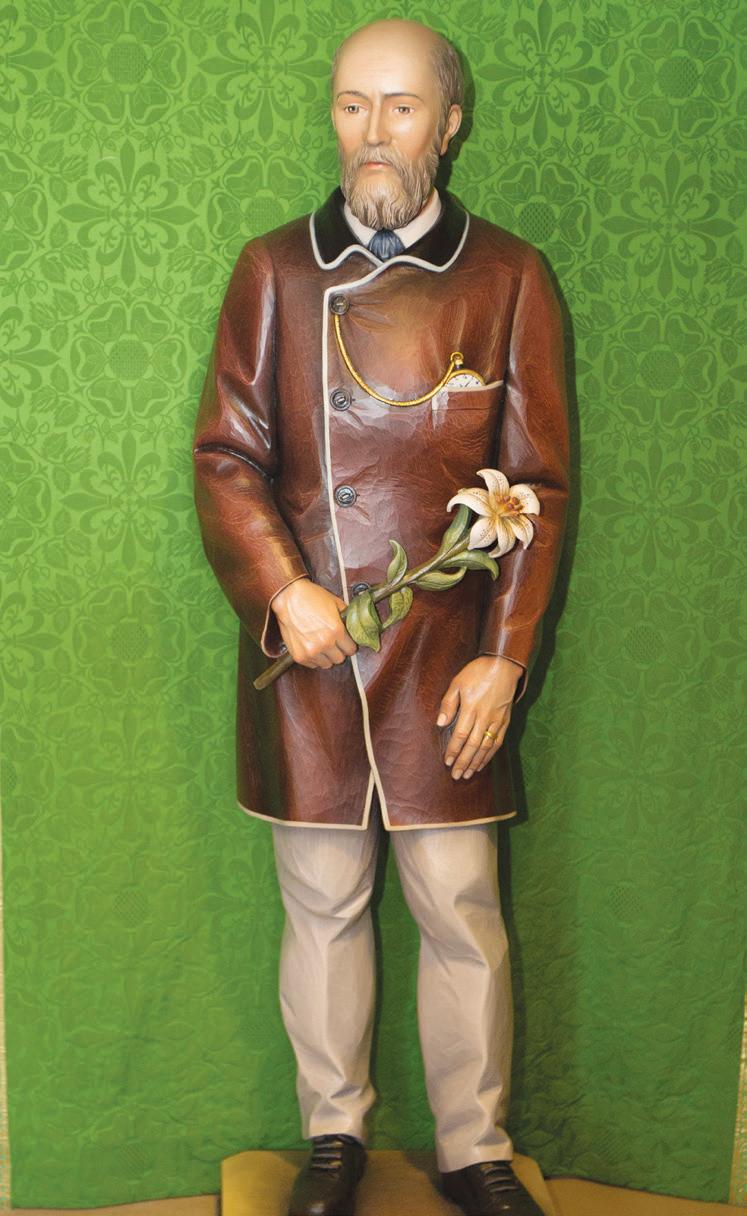
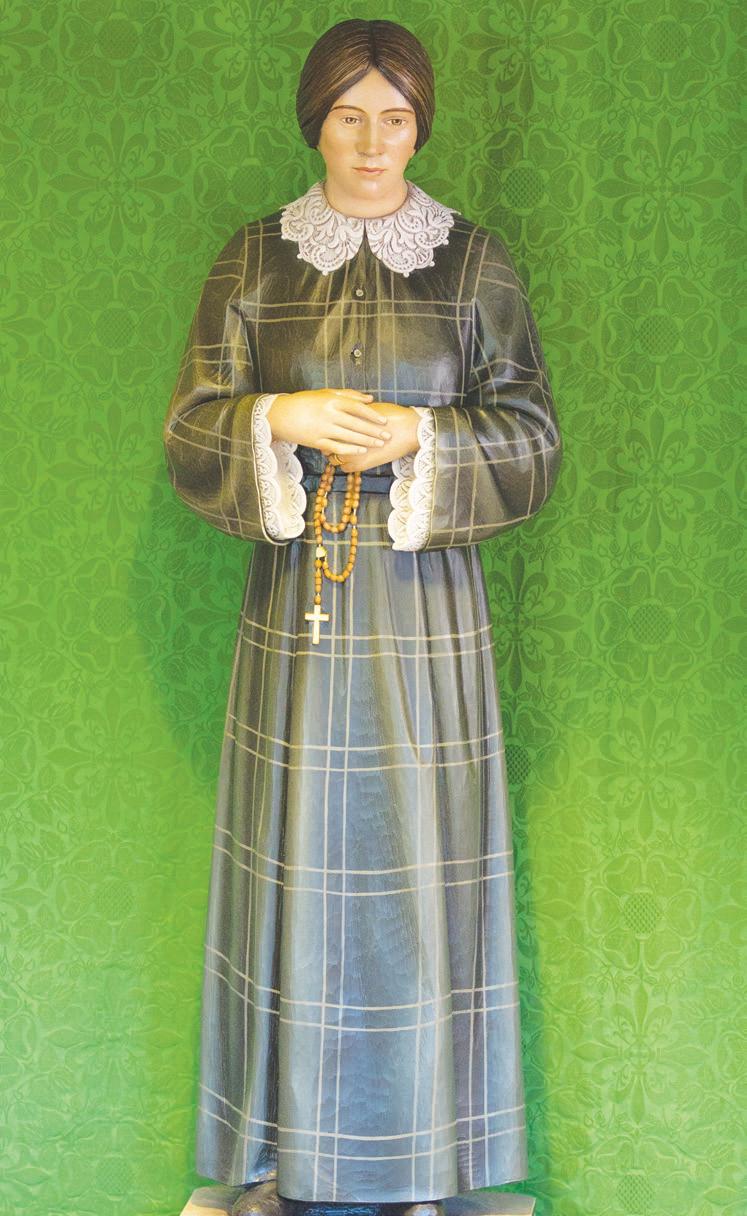
Oct. 6-7 — Veneration and activities at the Cathedral of St. Paul in St. Paul will include a Catholic schools rosary, a rosary procession from the Minnesota State Capitol, and Cor Jesu with Archbishop Bernard Hebda presiding. cathedralsaintpaul org/events-news
Oct. 7-10 — Veneration and events at the Basilica of St. Mary in Minneapolis will include a reception Mass, solemn vespers, a Holy Hour and closing Mass. mary org/event/relics-of-saint-therese-of-lisieux/
Oct. 12-15 — The relics will be displayed and venerated at St. Therese in Deephaven, with talks by Shane Page, director of evangelization at St. Michael in Gastonia, North Carolina; Masses with celebrants Archbishop Hebda and Auxiliary Bishop Michael Izen; confessions; Holy Hours; community dinner; and Father Francis Hoffman (“Father Rocky”), the executive director of Relevant Radio, hosting Rosary Across America. st-therese org/relics
Preparation
Preparation for the relics’ arrival has included collaboration among archdiocesan clergy and laity, including planning a rosary procession with the relics from the Minnesota State Capitol to the Cathedral and a Cor Jesu event at the Cathedral Oct. 6. Both events in the same area will “be a powerful moment,” Father Tran said.
A Holy Hour and Mass will be held the following day at the Cathedral to pray for the renewal of the family and for vocations — “two things this saintly family serves as a prime example and model,” Father Tran said.
Father Andrie envisions the various events as drawing together “different families, all these different kinds of walks of life ... all of them coming together around this little family from France in the 19th century that had a deep love for Christ and really embraced our beautiful faith in a radical way.”
Laura Hunziker — a St. Therese parishioner who this year started her role as human resources manager and community life coordinator for the parish and school — said more than 400 people have signed up to volunteer when the relics visit the parish; more volunteers are welcomed. Roles include parking attendant, greeter, relics attendant, adorer, and food preparation for a community dinner.
“I encourage those who are thinking about volunteering, who may be on the fence about doing it — this is an opportunity to not only have this wonderful chance to be part of St. Thérèse’s and her parents’ relics being here, but also it’s an opportunity to meet new people, be a part of a community.”
Saints and the Synod
In his request to Father Ruffray, Archbishop Hebda wrote, in part: “Through the Synod process, I trust that the Holy Spirit will bring about muchneeded healing and renewal for our local church. I believe that Saint Thérèse of Lisieux, along with her saintly parents
Saints Louis and Zélie Martin, can help bring about that healing and renewal. Their prayers and fervent love for one another in family life can greatly help and inspire the faithful and their families in our Archdiocese.”
In Archbishop Hebda’s pastoral letter, “You Will Be My Witnesses: Gathered and Sent From the Upper Room,” year one of the Archdiocesan Synod implementation focuses on small group formation at parishes. Year two focuses on the Mass and the Eucharist. Year three encourages parent and guardian faith formation.
Both Father Andrie and Father Tran said this saintly family’s example coincides with the Archdiocesan Synod implementation.
“Where God dwells is the family,” Father Tran said. “It’s a reminder for us that this renewal, this Synod, is not something that’s more or less from the top down, but it’s from the bottom up, in the family,” Father Tran said. “It begins there.”
“We want to renew families because … raising kids is hard,” Father Andrie said. “And we know that this little family wants to help us.”
Father Tran went on to explain that the “Eucharist was primordial to them — year two of the Synod. And small groups, well, the family is a small group — year one. So, their entire image is encapsulated there” in the Synod implementation.
These saints also exemplify hope — a much-needed virtue for our times, Father Andrie said.
“As Pope Francis says, this family is a family of hope, (and) God’s grace can just do great things through us and our families if we’re open to it. And there’s something really quite peaceful and delightful to be around somebody who’s a person of encouragement and a person of hope.”
Father Andrie encouraged all those interested in seeing the relics to “please come.”
“Try to make it to at least one place and trust that great things will happen.”
The full schedule of events can be found at archspm org/st-therese-relics/
MEET THE SAINTS
This year marks the 100th anniversary of St. Thérèse’s beatification, the 150th anniversary of her birth, the 165th anniversary of Sts. Louis and Zélie Martin’s marriage, and the 200th anniversary of St. Louis’ birth.
Laura Hunziker — a St. Therese in Deephaven parishioner and human resources manager and community life coordinator for the parish and school — said pastor Father Leonard Andrie “shared with me a novena from St. Thérèse ... now my husband and I pray it every day to help with our struggles with infertility,” she said. “It’s very refreshing to have this family to pray to, to reach out to for help with our struggles, knowing that they struggled as well.”
Sts. Louis and Zélie were married on July 13, 1858. They had seven daughters and two sons; four died at young ages. The couple participated in daily Mass and prayer and taught their motto to their children: “God must be served first,” according to materials prepared by St. Therese parish. They were the first husband and wife to be canonized as a couple, on Oct. 18, 2015. Their daughter, St. Thérèse, desired to be a saint from a young age. Though her request to enter Carmel at age 15 was initially denied, she ultimately became a discalced Carmelite nun, developing her “little way” of seeking heaven. She was inspired by letters St. Théophane Vénard wrote, said Father Tim Tran, parochial vicar of St. Stephen in Anoka. A missionary who traveled to Vietnam and was martyred, St. Théophane used language “roughly saying, I’m just like a little flower being plucked from our heavenly father’s garden,” Father Tran said. St. Thérèse “wrote in a letter saying that (St.) Théophane Vénard lived her ‘little way’ the best,” he said.
Vietnamese himself, Father Tran said he appreciates this connection. “I attribute my vocation to her intercession,” he said of St. Thérèse.
St. Thérèse died at age 24 from tuberculosis. She was canonized on May 17, 1925, and was declared a doctor of the Church in 1997. Her feast day is Oct. 1.
SEPTEMBER 28, 2023 THE CATHOLIC SPIRIT • 13
DAVE HRBACEK | THE CATHOLIC SPIRIT Statues of Sts. Zélie, left, and Louis Martin are on display at St. Therese in Deephaven.
Roasting coffee beans and dreams in the garage
By Christina Capecchi
For The Catholic Spirit
Nate Whipple, 37, made a go at smallbatch coffee roasting last year when he launched Karol Coffee Co., which is run from his garage and named after St. John Paul II, whose baptismal name was Karol. It is a step closer to Whipple’s dream of running a coffee shop near his parish, Holy Cross in Minneapolis, where he works as director of outreach and discipleship. He sells his coffee beans at farmers’ markets, pop-up shops and online at karolcoffeeco com
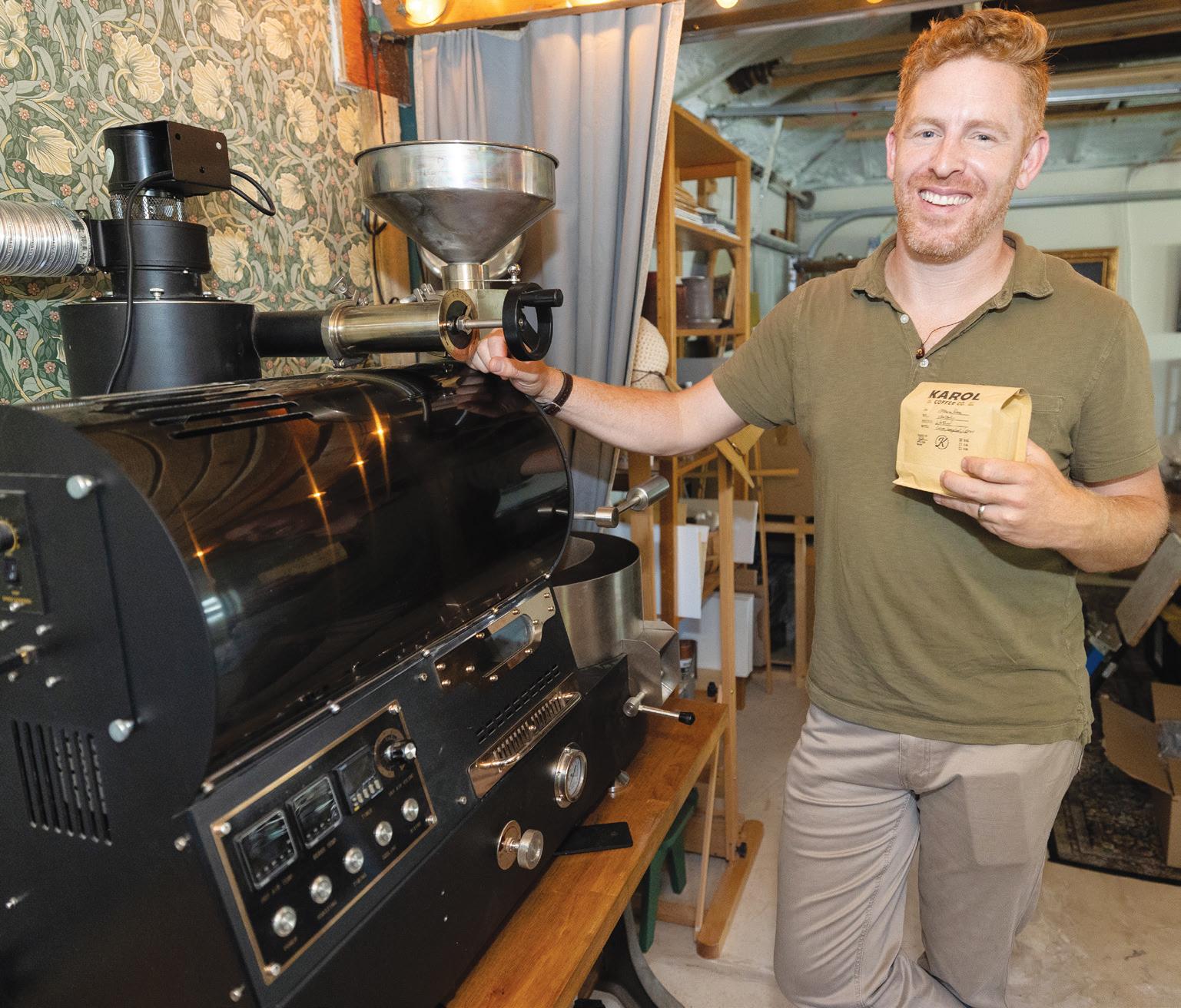
Q You’ve been on quite a journey from your childhood in Connecticut — grad school in Utah, OCIA, living in New York City, being a FOCUS missionary at Massachusetts Institute of Technology, going to seminary — to today, feeling settled with your wife, Megan, in an old green house in Northeast Minneapolis with a garden and a porch.
A It’s been a windy path. I look back, and I can see how the Lord was working at each moment to bring me to where I am now. My heart has been longing for stability, and our rootedness here in this place is something we’re able to bring other people into. We walk to church and to the local co-op where we shop. We know all our neighbors.
Q Was it hard to leave seminary?
A Yes. I think the Lord has given me a missionary heart, and I was discerning how he was inviting me to share it. This vocation opens up new possibilities. There are plenty of people I can reach because I’m not a priest. They’re both beautiful calls.
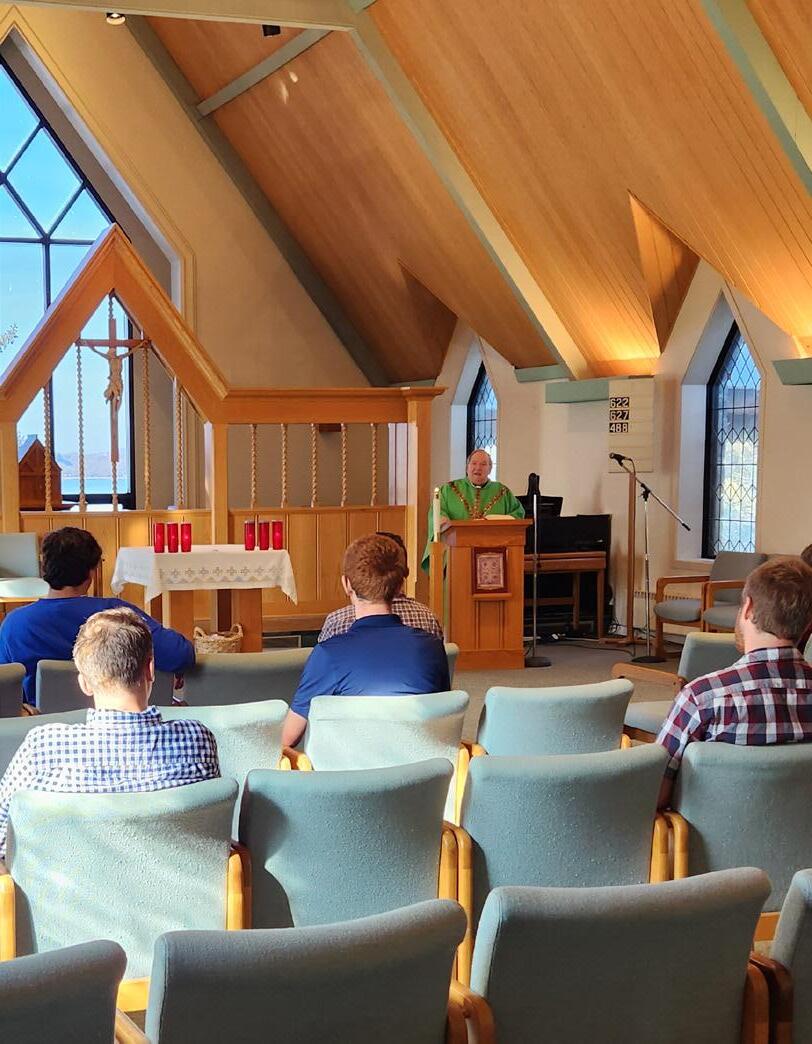
Q What’s the key to discerning your vocation?


A Make sure you’re praying daily and being totally transparent in spiritual direction.
Q What do you love about coffee?
A I love that coffee, for me, is ritualistic. It’s what I do in the morning. I get my coffee, and I pray. It’s so much a part of my daily life.
Q Last fall, you finished your garage
and bought a coffee roaster on Facebook Marketplace. Less than a year later, you have customers and a website!
A I wish I could say I had a plan. But that’s not really how I work, and I don’t think it’s how God works in my life. The next thing tends to just present itself. I do a lot of figuring things out on the fly.
Q Meanwhile, your wife quit her day job to do art full time. Have you, as a couple, decided it’s more important to do what you love than to make a lot of money?
A I actually do see coffee as being a way forward. There’s real opportunity for growth and making more money, so in a certain way it’s both/and.
Q You work in the garage with 2x4s overhead — snow boards, golf clubs, Christmas decorations, a bike hanging from the ceiling, a ladder at your side. But you’ve created ambiance with café lights, rugs and wallpaper.
A I love walking in here. It’s a constant feeling of, “Thank you, Lord.” It all feels
right. It’s all very me. Monday’s my day off at the parish, so I typically work here on Mondays and Saturdays. I’m in farmer’s market season, so I’m doing 50 to 75 pounds a week. If I’m roasting, I’ll have music on — indie folk, bluegrass, Watchhouse, Nathaniel Rateliff.
Q What have you learned so far?
A I’ve learned to know my limits, to be OK with a slower progression. There are a million things I wish I had 16 more hours a week to do.
For example, merch was too expensive, so I decided to figure it out myself, and I bought a screen press mechanism on Facebook Marketplace for $20.
I have to accept I can’t get to everything I want to — and I shouldn’t apologize for it constantly. This isn’t my full-time job. I have to be patient with the process and patient with myself.
Q Roasting is a step in that process.
A Right. The dream is the coffee shop, but I wasn’t going to get straight there. I figured out coffee roasting because it’s a way to start to build a brand, to build
a customer base, to try to understand the industry and, by the way, there’s an increase in your margins when you roast your own coffee.
It was both, “Take it easy, let it develop more slowly,” and also, “It will be better for us in the end.” It’s another whole revenue stream. So, I’m actually grateful that it has developed in the way that it has.

Q St. John Paul II is your patron.
A Most young people, when they learn about his life, would find him very relatable. This venture is all built on the Catholic principle of the dignity of human work. It’s just me, so I see the whole thing through from beginning to end — from buying the green beans to roasting, bagging, packaging. In a certain way, it doesn’t feel like work.
Q And you have neighbors who are like-minded.
A In June, we did a pop-up market in our alley. I sold coffee, a friend brewed beer, another sold candles, a family nearby did street tacos and lemonade.
We’ve been totally removed from all the means of producing our own things — whether it’s food, clothes, furniture, anything. So, I think for a lot of people — whether it’s DIY stuff or buying from someone you know is actually doing the work — being reconnected to the work is really important.
Some guys from the parish and I have gotten into NEWPOLITY, a podcast and publication that explores how to live out Catholic social teaching. A couple of them have really run with it. One quit his super high-paying corporate job and is going to start a timber-framing business.
The idea of passing on a trade is mostly lost. So, you ask yourself, “Can I teach my child how to do the thing that I’m doing?” It’s about integration of life. You want to be able to share with your family what you do for the vast majority of your waking hours.
Q What do you love about being Catholic?
A I love that it touches all areas of life. A lot of people think of the Church as a PLEASE TURN TO Q&A ON PAGE 19
14 • THE CATHOLIC SPIRIT FAITH+CULTURE SEPTEMBER 28, 2023 Discernment Retreat with Bishop Williams SATURDAY, OCTOBER 28 9 A.M. - 7 P.M. REGISTER ONLINE before Monday, October 23 at 10000vocations.org/discernment-day-with-bishop For men who are pursuing or have completed a college degree november 3-5 Christ the King Retreat Center For Catholic men, ages 17–24, who do not have a college degree RSVP REQUIRED before Friday, October 27 www.10000vocations.org Archbishop’s discernment retreat
DAVE HRBACEK | THE CATHOLIC SPIRIT
FOCUSONFAITH
SUNDAY SCRIPTURES | FATHER MICHAEL SKLUZACEK
Change your mind
In our media-saturated world, it’s never been easier to share our opinion. All it takes is an effortless click to post it on social media. When we feel strongly about an issue, we want others to know that we have an opinion that’s founded on virtue. We like to demonstrate the moral correctness of our positions and actions. We want people to know we are of good character and virtuous. Sporting an “I gave blood today” pin, or an “I voted” sticker are innocent examples. Virtue signaling seems to be ubiquitous today, but it’s nothing new.
In Sunday’s Gospel, Jesus gives the chief priests and elders a chance to share their opinion. “What is your opinion?” he asks, and then tells the scenario of the two sons asked to work in their father’s vineyard. One is virtuous; the other isn’t. We are surprised to hear that the virtuous one is not the one who readily agreed to do his father’s will. Rather, the virtuous one is the son who first balked at doing his father’s will, but then changed his mind and went to work. Then Jesus shocks his audience further by saying, “Amen I say to you, tax collectors and prostitutes are entering the kingdom of God before you.” After the chief priests and elders signal their virtue, Jesus calls out their claim to moral uprightness.
In her short story, “The Lame Shall Enter First,” Flannery O’Connor similarly shocks readers. Sheppard is a well-meaning
do-gooder who makes a great effort to reform a juvenile delinquent boy, Rufus, while neglecting his own son, Norton. He prides himself on his compassionate plan to reform Rufus, the lame boy, into an upstanding and successful citizen. All the while, Sheppard neglects and disdains his own son who is mourning his mother’s death and desperately craves his father’s love. Rufus, the delinquent boy, has contempt for Sheppard’s efforts. Trapped by the snare of evil, he acts out, with desperate attempts for attention. Yet he knows that he cannot save himself. Norton invites Rufus to read the Bible with him. Together, the two boys come to believe that only Jesus can save them. This disgusts Sheppard, who believes the Bible is a crutch for people who can’t make it through life on their own. Rufus contemptuously rejects Sheppard’s attempts to save him, and Sheppard’s prideful attempts at virtue in the end fall flat.
Rufus and Norton, both failures by the world’s standards, are the lame who enter the kingdom first. They enter first, not because of their sins, but because they know they need a savior. Likewise, the tax collectors and prostitutes who Jesus says enter the kingdom of God “before you,” do so, not because of their sins, but because they know they need a savior.
There’s nothing wrong with being virtuous; indeed, we should all strive for virtue. But if we think our virtue will save us, or anyone else, we may not be first in line for the kingdom. Like the son who changed his mind, today’s Gospel challenges me to ask myself, “Where do I need to change my mind, and so accept the salvation offered me by Jesus Christ?”
Father Skluzacek is director of pastoral formation at The St. Paul Seminary in St. Paul. He can be reached at sklu9211@stthomas edu
faith. For example, if I have a question about just war theory, or the Church’s teaching on sexual ethics, and a well-informed Catholic gives me a reasonable explanation that I find valuable, that is simply agreeing with the proposition and the rationale behind the proposition. And please don’t get me wrong. It remains good to ask questions and worthwhile to know the reasons why.
But if my faith does not go any deeper than that, my agreement is merely conditional: “If you can give me a good reason, and explain it well, then I will check that box that says I agree with this proposition.”
DAILY Scriptures
Sunday, Oct. 1
Twenty-sixth Sunday in Ordinary Time Ez 18:25-28 Phil 2:1-11 Mt 21:28-32
Monday, Oct. 2 Guardian Angels Zec 8:1-8 Mt 18:1-5, 10
Tuesday, Oct. 3 Zec 8:20-23 Lk 9:51-56
Wednesday, Oct. 4 St. Francis of Assisi Neh 2:1-8 Lk 9:57-62
Thursday, Oct. 5 Neh 8:1-4a, 5-6, 7b-12 Lk 10:1-12
Friday, Oct. 6 Bar 1:15-22 Lk 10:13-16
Saturday, Oct. 7
Our Lady of the Rosary Bar 4:5-12, 27-29 Lk 10:17-24
Sunday, Oct. 8
Twenty-seventh Sunday In Ordinary Time Is 5:1-7 Phil 4:6-9 Mt 21:33-43
Monday, Oct. 9 Jon 1:1—2:1-2, 11 Lk 10:25-37
Q I have a friend with whom I am trying to share the Gospel. He has great questions, and I like trying to offer intelligent and rational answers, but I’m not sure if he has faith yet. What should I do?
A This is a fantastic question. And I am so grateful that you are willing to respond to the great commission that Jesus has issued to every disciple to spread the good news. I am also grateful that you value your friend’s questions. Too often, Catholics can be accused of not wanting to engage in reasonable and rational argument. Of course, nothing could be further from the truth. There is an incredible intellectual pedigree that has been given to us over the last 2,000 years that we must not take for granted.
At the same time, what you described is something I have been thinking about for some time: the difference between agreement and faith. At first glance, it might seem that these two terms mean the same thing, which is sometimes the case. But there is something about a living faith that goes beyond mere agreement.
I want to reaffirm that questions are good. What does the Church teach, or why, are good questions. But at some point, we recognize that faith might prompt us to ask the question why less and less.
I can think of many times in my life when I have wanted to know the reason the Church taught this or that. I have asked that question of intelligent and faithful Catholics, and they have been able to give me a good reason. This has been helpful for me.
However, if I have a question about an article of the faith, and someone gives me a reason that is well-articulated, and I assent to the proposition, that is me merely agreeing. It is not necessarily
KNOW the SAINTS
In fact, this might be what many of us do on Sunday morning when we profess the Nicene Creed. It may be that all we are doing is saying, “I agree with all of these propositions about God.” Is that faith? Well, not really. It might be the beginning of faith. It might be a part of faith. But faith is much more.
Faith is when I submit my intellect and will to God as he has revealed himself. One of the things that this means is that God (or the Catholic Church) doesn’t have to constantly convince me that a proposition is true. Consider what a faith like that would look like. Every next step, or every new thing that God wanted to invite me into or reveal about himself, would need to be proven. I would not be willing to act until God or the Church gave me a reason why.
God has already given us a reason why. If I answer the big questions — questions like, Is Jesus God? Did Jesus found the Catholic Church? Did Jesus promise to lead the Church into all truth? — then I no longer require reasons why.
God does not merely desire our agreement. God desires a relationship with us, built on trust. Yes, we get to ask questions. But there is a big difference between needing to be convinced of the reason why first and the way in which St. Anselm defined theology as “faith seeking understanding.”
Faithful people will ask the big questions. Faithful people will ask hard questions. But not so that they can end up agreeing with God. Rather, the faithful person asks the questions so that they can trust even more deeply.
So, after all of that, are you trying to help your friend become a person who merely agrees with the propositions of the Catholic faith? Or do you want to help him have a real relationship with the God of trust and faith?
Father Schmitz is director of youth and young adult ministry for the Diocese of Duluth. He leads the Newman Center at the University of Minnesota Duluth.
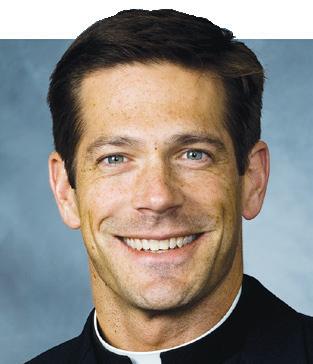
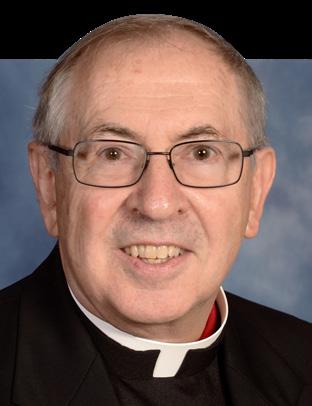
Tuesday, Oct. 10 Jon 3:1-10 Lk 10:38-42
Wednesday, Oct. 11 Jon 4:1-11 Lk 11:1-4
Thursday, Oct. 12 Mal 3:13-20b Lk 11:5-13
Friday, Oct. 13 Jl 1:13-15; 2:1-2 Lk 11:15-26
Saturday, Oct. 14 Jl 4:12-21 Lk 11:27-28
Sunday, Oct. 15
Twenty-eighth Sunday in Ordinary Time Is 25:6-10a Phil 4:12-14, 19-20 Mt 22:1-14
ST. FAUSTINA KOWALSKA (1905-1938). The visionary called the apostle of divine mercy deferred a religious calling to help her poor Polish family with her earnings as a housekeeper. She entered the Sisters of Our Lady of Mercy in 1925, serving in Krakow, Plock and Vilnius as a cook, gardener and porter until her early death from tuberculosis. After reporting her visions of Jesus as the divine mercy, she was ordered to have a psychiatric evaluation and the Church posthumously condemned her 700page diary. Her fellow Pole, Cardinal Karol Wojtyła, championed her cause and had the ban removed after a retranslation; later, as Pope John Paul II, he canonized her and designated the Second Sunday of Easter as Divine Mercy Sunday. Her feast day is Oct. 5.
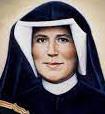
SEPTEMBER 28, 2023 THE CATHOLIC SPIRIT • 15
Faith is more than just agreeing with God and the Church
ASK FATHER MIKE | FATHER MICHAEL SCHMITZ
FAITH AT HOME | LAURA KELLY FANUCCI
What love means, and what it doesn’t guarantee
When I was a new parent, I assumed love meant protection.
I researched the safest car seats, made sure the crib was secure, and doublechecked the bath water for the right temperature every night.
I believed my job as a mother was to keep my children healthy and safe.
That well-constructed façade soon started to crumble. My husband and I lost a baby to miscarriage, then twins after their premature birth. While we thank God every day for the five sons we are raising, we have also learned the hard way that there is so much suffering from which we cannot protect our children.
temptation but deliver us from evil.”
Protect us, we plead.
Yet God’s love is mysterious and multi-faceted. Sometimes it protects; other times it prepares.
In the months since I was diagnosed with cancer, I have felt an overwhelming sense of God’s providence. The road ahead was prepared for me in astonishing ways, from friends who helped me find the right doctors to professional disappointments that turned out to give the precise space I needed to step back from my work.
Yet what I wanted instead, what I pleaded for while I wept in the night, was for God to protect me. To shield me from this suffering and let this cup pass me by.
Wasn’t God our defender, deliverer and shield?
Over time, God began to open my eyes to the wider truth that love can mean many things: Protecting those we adore from any kind of harm. Or preparing them for the pain that might arrive.
The former is what we wish parenting could be. The latter is what parenting is.
I cannot Bubble Wrap my children to guard them from life’s bumps and bruises. Even if I kept them safe at home, locked the front door, and never let them outside where injuries, accidents, diseases or disasters might destroy them, they would never lead a full life.
So as a parent, I let my children step out into a world that will wound them. God does the same for us.
Next to our front door hangs a woodcut from Ireland, the same that hung in my parents’ home. It features a mother standing in a doorway with her hands clasped in prayer, watching her young child walk down the front path. Beneath the scene is written “Prayer for A Little Child” by Winifred M. Letts, a blessing that ends with these words:
“From cut and from tumble — from sickness and weeping,
May God have my jewel this day in his keeping.”
Scripture promises that God counts the hairs on my children’s heads, watches over while they slumber, gathers their tears in a bottle, and sends them new mercies each morning. Even when God permits — for mysterious reasons beyond my understanding — suffering or sorrow to befall my beloveds, a way through the wilderness will still be made for them.
Today we sent our oldest child off to high school. Next week, our youngest will start preschool. Back-to-school is always a bittersweet reminder that parenting brings a succession of goodbyes.
But we have been readied for this time, too. Love protects, prepares and pushes us to trust beyond what we can see.
MARCH 9, 2017 • SAINT PAUL, MINNESOTA
We cannot protect ourselves as parents, either.
If you’re like me, you might assume God’s love should mean protection. After all, the Our Father we pray daily gives voice to this exact petition: “Lead us not into
eal challenges. Catholics are called to respond.
Complete protection — even if such a reality were possible — would mean the loss of their freedom. In truth, my children could not flourish if their safety was my only goal. The mystery of free will means the same for all of us as humans.
Fanucci is an author, speaker and founder of Mothering Spirit, an online gathering place on parenting and spirituality at motheringspirit com
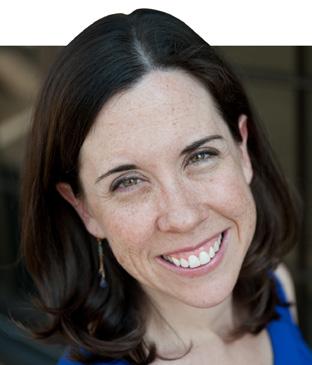 CATHOLIC OR NOTHING | COLIN MILLER
CATHOLIC OR NOTHING | COLIN MILLER
Hospitality houses as schools of virtue
OTECT LIFE & MAN DIGNITY
giving alms, offering a drink to the thirsty and the rest. Dorothy and Peter’s emphasis on these was so strong that they advocated works of mercy as a daily practice, not just something we do sometimes. It was to become a routine habit of our lives.
bishops, dynamic Church leaders, and 1,000+ Catholics from for a day of inspiration and advocacy at our State Capitol.
students 22 -and -under FREE! lunch included with Learn the issues, hear dynamic speakers, and meet your legislators.
Two months ago, I wrote about the Catholic Worker Movement founded by Peter Maurin and Dorothy Day and their vision for agenda-less hospitality. I wrote that this was just the first difference between their Catholic vision of hospitality and more conventional visions of social service. This month, I want to reflect on another difference.
The primary reason for the daily practice of the works of mercy, however, is not that there is so much lack in the world, but that there is so much lack in us. In the Catholic tradition, for instance, almsgiving is not just important because otherwise the poor would go without, though that’s a consideration. Rather, almsgiving is good for the giver. It “washes away all sins,” as the Book of Tobit says. It’s not so much us helping, as us being helped. In it we are not the benefactor, deserving a pat on the back; we are the receiver and Christ is the benefactor. As we do it, we acknowledge our own sinfulness and ask that as we extend mercy to someone else, Christ will extend mercy to us.
sociological laws, statistical probabilities, or predictable products of psychological development. We should not approach them from the posture of a social engineer — trying to figure out what input will lead to the best social outcome — or calculating what will be the best way to make this person more nearly middle class.

Rather, hospitality houses are where we learn what Maurin called “the art of human contacts.” That is, receiving each person for who they are, and what they bring to me right now, in that moment — not worrying about where they come from or where I think they should get.
Most of the time, when we think of the poor, or the works of mercy, we think about helping someone. And we think about it primarily in terms of providing some physical need: food, shelter, socks or whatever. In this way of viewing things, whether it be at a hospitality house or giving five bucks to the guy holding the sign on the street corner, the equation is simple. There is some sort of lack, which my abundant resources supply, and that is how I help people. Fair enough.
The Catholic Worker vision goes deeper than that. It starts, indeed, with an emphasis on the works of mercy: feeding the hungry, sheltering the homeless,
INSIDE THE CAPITOL | MCC
See the newly renovated State Capitol! and register at CatholicsAtTheCapitol.org
Respect life: The right option at the end of life
As with almsgiving, so too with the rest of the works of mercy. In Jesus’ famous parable where, you might say, he institutes the works of mercy, he says that “in as much as you did it to the least of these, you did it to me” (Mt 25:40). Catholic Worker houses of hospitality, in other words, are primarily places where we meet Christ. In this sense, they are not in the first instance for others, they are primarily for us. Every encounter with another person, especially the poor, in this perspective, is an encounter with our Lord himself.
Peter Maurin called this approach “personalism.” It emphasizes that people are not mere instances of

You may hear physician-assisted suicide (PAS) referred to as “medical aid in dying” or specifically a bill number, HF1930/SF1813 — the “End of Life Options Act.” But no matter what sort of linguistic gymnastics are employed, this practice of physicians providing people with lethal drugs to end their lives does not respect life. Instead, it opens a Pandora’s box of dangerous consequences that will end up endangering the health care choices of the rest of us.
HOSTS: SPONSORS:
Physician-assisted suicide creates pressure on vulnerable individuals to end their lives. It sends a message that only the healthy and able-bodied matter. It undermines the dignity of people living with chronic illness, disability, or nearing the end of life.
When PAS is legal, patients report feeling obligated to request physician-assisted suicide due to societal and familial expectations. According to a Washington State Department of Health annual report, 56 percent of those who requested assisted suicide in 2021 stated
So, yes, Catholic Worker hospitality houses are places where the poor are fed, clothed and housed. But they are also places where I might slowly learn to release my need for control, my desire to have all the answers and my love of being the good guy. I learn to receive the person in front of me, not as if she was Christ, but as Christ, as the “Rule of St. Benedict” says. With Christ in front of my eyes, I am not asking how I can help that person, but what Christ wants to do with me, right then and there.
Hospitality houses, in other words, are schools of virtue. They are not about us transforming others, they are about Christ transforming us.
Miller is director of pastoral care and outreach at Assumption in St. Paul. He has a Ph.D. in theology from Duke University, and lives with his family at the Maurin House Catholic Worker community in Columbia Heights. You can reach him at colin miller1@protonmail com
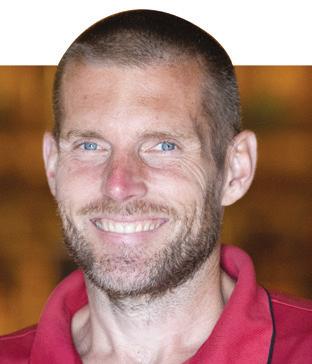
that they feared they were a burden to their family, friends and other caregivers. What sort of “option” is it to feel obligated to kill yourself? The right to die will become the duty to die.
This coercion is deeply troubling and undermines the principles of compassion and care that should define our approach to end-of-life decisions.
Minnesota’s proposed PAS bill is one of the most aggressive assisted suicide bills in the country because it lacks meaningful safeguards for older adults and people with disabilities. It has no family notification requirement and requires no witnesses when the lifeending drugs are ingested, which could lead to elder abuse.
The potential for misdiagnoses or errors in determining whether a patient is terminally ill and thus eligible for PAS is a sobering reality. We all know

PLEASE SEE INSIDE THE CAPITOL ON NEXT PAGE 16 • THE CATHOLIC SPIRIT SEPTEMBER 28, 2023 COMMENTARY
GLORIA PURIVS Black Catholics United for Life ARCHBISHOP BERNARD HEBDA
s is our moment. Let’s go!
BISHOP ANDREW COZZENS Archdiocese of Saint Paul & Minneapolis
Suffering unleashes love and blankets
My best friend from college was diagnosed with cancer one month after me. I had surgery in June, she in July. Our chemo treatments began one week apart. I started first. Though we are treating different cancers, it was a comfort to be able to tell her what my experience was like beforehand.
We text back and forth frequently, laughing and occasionally lamenting. We share pictures of our shaved heads and what electrolyte drinks help for the side effects. As strange as it sounds, our concurrent diagnoses were an unexpected mercy. We are similar in temperament: straight shooters not prone to sentimentality, but equally devout in our love of the Lord. To be able to walk this road together has strengthened me in untold ways. To pray for her healing, that God would grant her length of days to see her children marry and have children of their own, is one of the great honors of my day.
There’s nothing quite like illness to heighten one’s experience of being a part of the body of Christ. And as St. John Paul II pointed out, “suffering unleashes love” in myriad, creative ways.
CATHOLIC WATCHMEN | DEACON GORDON BIRD
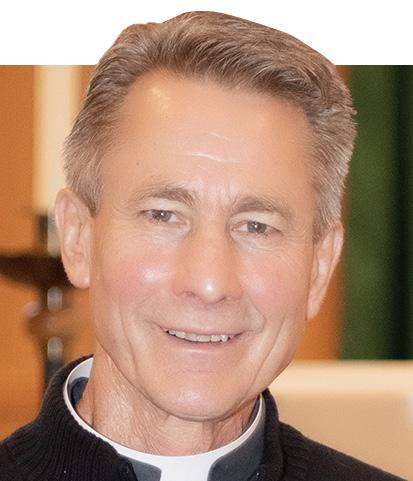
Every step of the way with Mary
The most holy rosary takes me on a journey through the Gospel story where the Blessed Mother’s example of holiness is always challenging me to step it up — bringing me closer to Jesus.
I did not grow up as a cradle Catholic, yet I hear from many who did that they would recite the rosary regularly after their evening meal with mom and dad. Its meditative repetition helped them digest their meal as their parents led the prayerful charge. Keeping alert and maintaining a prayerful posture at times may have been challenging, yet it was clear to me that the impact of their rosary experiences still resonates with them to this day.
If you give the mysteries of the rosary and its scriptural references their just due, converts like me and many non-Catholics eventually see that the decades, the messages within each mystery and contemplative nature of the prayer is all about Mary leading us to Jesus. She teaches in this devotion how to step it up as his disciples. She never misses a step as one observes her various roles as the first
INSIDE THE CAPITOL
CONTINUED FROM PREVIOUS PAGE
we should be offering better care, including pain management, and not hastening death.
This is just a glimpse of the myriad of problems created if we allow physicians to provide people with lethal drugs to end their lives. Is this what doctors are for? What does it mean to turn hospitals of healing into places where you can be killed? Will there be disincentives to providing better care when it is
After my diagnosis, I reached out to a woman who had taken a prayer practicum with me several years prior. She’d had cancer twice 30 years apart and I wondered if I could ask her some questions. Our conversation was immensely helpful and a week later, a huge box arrived from her. It was filled with tricks and tonics to help me through chemo: anti-nausea lozenges and teas, scent-free lotion because sometimes I cannot stand the smell of fragrances, tonics for mouth sores, recommended snacks for the day of the infusion, and a soft blanket with a few words of encouragement sewn into it, among other things. I have to fight my dog, Veronica, who cannot even read, to use it as she quickly claimed it for herself.
Cards offering prayers and Masses came flooding in, so much so I had to buy three more boxes of thankyou notes. A friend brought me holy oils and a relic from St. Charbel’s monastery in Lebanon. Another sent me a stuffed dinosaur because she read that somatic experiences, like hugging a toy, can help with pain — it does! Another friend hand-delivered vanilla milkshakes because I couldn’t stomach anything else. People I do not know reached out on social media to offer prayers. My brother, a priest with an extraordinarily demanding schedule, made time to bring the Eucharist, meals and anointing. As my hair decided to take a lengthy sabbatical, my sister sent me the prettiest assortment of head coverings. Two of my other sisters are coming to care for me, using their own time and resources to tend to me as my husband begins his new (and much better) job. And he has tended to me with heroic patience, tenderness and humor, never once making me feel like a burden.
Then there’s the blankets. One woman sent me a
disciple, humble servant, attentive and Blessed Mother throughout the joyful, luminous, sorrowful and glorious mysteries. From the Annunciation to the coronation of Mary as queen of heaven, she is teaching and offering her children the fruits of the Gospel. As Catholics, we give the rosary special attention in October. The feast of Our Lady of the Rosary is Oct. 7.
In spiritual warfare, St. Padre Pio proclaimed the rosary as “the weapon for these times.” The rosary was often noted as the favorite prayer of St. John Paul II. During his papacy, in his apostolic letter “Rosarium Virginis Mariae,” he writes that “the Rosary, though clearly Marian in character, is at heart a Christocentric prayer. In the sobriety of its elements, it has all the depth of the Gospel message in its entirety, of which it can be said to be a compendium.” Hence, he proclaimed October 2002 to October 2003 the Year of the Rosary, with the rosary to be rediscovered and the Blessed Mother’s powerful intercession leading the prayerful every step of the way.
Mary pursues and leads us to a life of intimacy with Christ. Praying, meditating and contemplating the mysteries of the life, death and resurrection of Jesus through the rosary, we experience many Marian teaching moments. Soon after the joyful mystery of the Annunciation, when she humbly accepts God’s will to bear “the Son of God” (Lk 1:35), Mary demonstrates that the love of God and the love of neighbor are inseparable. “In those days Mary arose and went with haste…” (Lk 1:39) — not missing an opportunity to serve her cousin Elizabeth in the visitation, exemplifying the two greatest commandments.
Oh loving, good Samaritan, I am profoundly aware of your presence in so many acts of love. You have stopped at the roadside of my suffering, anointed me, tended my wounds, and gathered me up to a safe place where a multitude of friends, family, and strangers join you in caring for me. Lord, do not forget their kindnesses.
blanket bearing the image of Our Lady of Guadalupe, so I could literally wrap myself in her mantle. I do. There were blankets in multiple gift boxes and warm blankets draped over me during my infusions. Blankets, like soothing hugs, miraculously appearing from everywhere.
Oh loving, good Samaritan, I am profoundly aware of your presence in so many acts of love. You have stopped at the roadside of my suffering, anointed me, tended my wounds, and gathered me up to a safe place where a multitude of friends, family, and strangers join you in caring for me. Lord, do not forget their kindnesses. Bless them a hundredfold. Perhaps, with a warm and lovely blanket? Amen.
Kelly Stanchina is the author of 13 books, a retreat leader and speaker. Visit her website at lizk org or follow her on Instagram at lizktoday
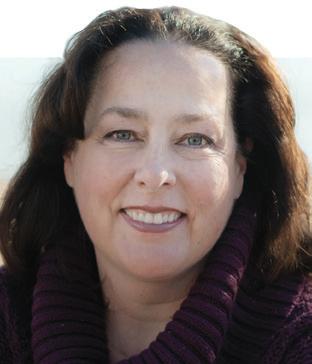
Mary understands how the greatness of God lives at the level of ordinary life, and she teaches us through all the mysteries of the life of Jesus via the rosary. She sanctifies, instructs and guides us every step of the way to know and love Jesus. Her last words recorded in the New Testament at the wedding in Cana, are “Do whatever he tells you” (Jn 2:5). It is a profound message she herself followed obediently during Jesus’ three-year ministry. This message by her example resonates in our hearts today should we embrace the habit of praying the rosary daily.
Prayer vigils during Holy Hours that include the rosary are a signature mark of the Catholic Watchmen. This is because we are striving continually to be spiritual fathers like St. Joseph — providers, protectors and leaders of the faith — as he was for the Holy Family during his life. With St. Joseph as our model, Catholic Watchmen keep with Mary in praying the rosary. Because in the Gospel story of Jesus’ life, death and resurrection, Mary never misses a step as the mother of our Lord, in bringing us closer to the saving knowledge and love that her son, our Savior, has for us.
Deacon Bird ministers to St. Joseph in Rosemount and All Saints in Lakeville and assists with the archdiocesan Catholic Watchmen movement. See heroicmen com for existing tools supported by the archdiocese to enrich parish apostolates for ministry to men. For Watchmen start-up materials or any other questions regarding ministry to men, contact him at gordonbird@rocketmail com
much cheaper to offer someone assisted suicide? Already in Canada, where PAS is legal, people are being offered assisted suicide when they cannot pay their debts or when assistance such as wheelchair ramps are deemed too expensive.
Although the Catholic Church’s stance against assisted suicide and its call for better health care access is unequivocal, we are not alone. The Minnesota Catholic Conference is proud to be a member of the diverse Minnesota Alliance for Ethical Care. We are grateful to partner with fellow people of faith
from Muslims and Lutherans to Jews and non-denominational Christians. But the alliance is also strengthened by disability-rights advocates, mental health and medical professionals, veterans’ groups, legislators from the left and the right, and every Minnesotan who shares concerns about the ethical implications of PAS.
We invite you, our readers, to act as individuals and in your parishes. Stand with us to respect life by seeking ways to provide real care throughout life’s journey.
Visit ethicalcaremn org to reach out to
your state legislators and tell them to vote against this dangerous bill. Then, take some time to learn more about why so many diverse partners are opposing the so-called “End of Life Options Act,” and find ways to get involved, such as writing letters to the editor.
To stay up to date on the work of the Minnesota Catholic Conference, join the Catholic Advocacy Network at mncatholic org/join
“Inside the Capitol” is an update from Minnesota Catholic Conference staff.
SEPTEMBER 28, 2023 COMMENTARY THE CATHOLIC SPIRIT • 17
YOUR HEART, HIS HOME | LIZ KELLY STANCHINA
“Iam the good shepherd. The good shepherd lays down his life for his sheep. … I know mine and mine know me ... My sheep hear my voice; I know them, and they follow me” (Jn 10:11, 14, 27).
Now bear with me, as this Gospel reading might hold the key to understanding why I wholeheartedly embrace my Catholic faith.
In today’s world, driven by self-promotion and the pursuit of individual desires, being likened to a sheep might not garner likes on social media platforms. This sentiment wasn’t any different two millennia ago. Some of the Jews who heard Jesus preach thought he was possessed, even going so far as wanting to stone him. Fastforward to our time. If Jesus were here now, he might have faced the modern equivalent of persecution by being “canceled,” deplatformed and demonized in an instant. Yet, despite the shifting tides of culture, this teaching remains as relevant and powerful today as it was 2,000 years ago. And, despite all the noise, I’m more Catholic now than ever. But it wasn’t always the case.
I grew up in Vilnius, Lithuania, and was raised as a Roman Catholic in a Polish church. Back then, religion was labeled as the “opium for the masses,” and the only “God” sanctioned by society and the school system was the promising but distant utopia of communism. Many magnificent, centuries-old churches stood neglected, turned into warehouses, or repurposed for general use. Going to church was a choice to be made in a largely atheist society. It wasn’t uncommon for some teachers, real “communazis,” as we labeled them, to demand that we raise our hand if we believed in God. It was like an unspoken agreement in the room — we all knew who attended church, and the silence that followed was so thick you could almost slice it with a knife. Not a single kid dared to make a peep. My mother was a pillar of spiritual strength, deeply devoted to Our Lady. While my father was a believer, he wasn’t a regular churchgoer. Thanks to my mom, my brother and I received a solid grounding in the fundamentals of our faith. She planted the seeds of faith and instilled in us the knowledge that the Lord is our shepherd, regardless of the circumstances.
Now, here’s the twist: I didn’t know what a Bible was until I
was 17. It was given to me by a Protestant minister. Bibles were banned. However, after the collapse of the USSR in 1991, there was an influx of Protestants, Mormons, Hindus and various other religious groups promoting a new age of worship. Life took a tumultuous turn, with new rules, a touch of chaos and the emergence of new idols. Yet, amid the upheaval, the Catholic Church stood as an unwavering beacon of stability. The Mass, the Eucharist, the comforting presence of Mary and Jesus — these were constant sources of solace for me.
St. John Paul II’s visit to Lithuania in 1993 injected a sense of faith renewal into those times.
As I entered my 20s, the Lord gave me an opportunity to travel the globe. Often, like a lost sheep, I found myself wandering across different corners of the world and moving farther and farther away from my faith. The Lord had to send an American missionary to the island of Taiwan to find me. That missionary was the only Catholic with a Southern Baptist church effort in Taiwan. A guy with a theology degree who discerned out of priesthood became my husband. Really, God, what are the odds? Eventually, we found the only Catholic church on the island, and the rest is history.
Jesus said, “The thief comes only to steal and kill and destroy. I have come so that they may have life and have it to the full” (Jn 10:10). This verse perfectly encapsulates how Jesus welcomes us back into his fold. He is the ultimate shepherd, tirelessly seeking even those who have wandered farthest.
Webskowski, 48, and her husband, Joshua, have been active members at St. Michael in St. Michael for over 20 years, engaging in various ministries, including Eucharistic services. Their two children attended St. Michael Catholic School. Webskowski’s professional career spans more than 20 years in international banking, technology, sales and marketing. Recently, she transitioned from the corporate world and now is parish business administrator at Holy Name of Jesus in Wayzata. With an MBA from the University of St. Thomas in St. Paul, she is fluent in five languages and enjoys travel, gardening and baking.
“Why I am Catholic” is an ongoing series in The Catholic Spirit. Want to share why you are Catholic? Submit your story in 300-500 words to CatholiCSpirit@arChSpm org with subject line “Why I am Catholic.”

Jenna Webskowski
DAVE HRBACEK | THE CATHOLIC SPIRIT
Why I am Catholic
18 • THE CATHOLIC SPIRIT SEPTEMBER 28, 2023
CALENDAR
PARISH EVENTS
Fall Speaker Series on Corporal Works of Mercy — Oct. 4, 11, 25: 6–7 p.m. at Guardian Angels, 8260 Fourth St. N., Oakdale. Speaker series on respect life, poverty, homelessness and mission. guardian-angelS org
Women’s Club Garage Sale — Oct. 4-6: St. Thomas the Apostle, 20000 County Road 10, Corcoran. 1–8 p.m. Oct. 4; 9 a.m.–8 p.m. Oct. 5 (50% off 4–8 p.m.); 9 a.m.–1:30 p.m. Oct. 6 ($5/bag day). Sale includes clothing, baby items and household items. ChurChofStthomaS org
Of Ministry and Music — Oct. 5: 6–9 p.m. at St. Olaf, 215 S. Eighth St., Minneapolis. This year’s Oktoberfest theme features German food and beverages along with The Minnesota Beer Choir to provide entertainment.
Saintolaf org/ofminiStryandmuS C
Booyah — Oct. 7-8: 8 a.m.–12 p.m. at St. Mary, 423 Fifth St. S., Stillwater. $10 per quart for less than 4 quarts. $9 per quart for 4 quarts or more. StmiChaelandStmaryStillwater org
Polka Mass and German Dinner — Oct. 8: 11 a.m.–3 p.m. at St. Boniface, 633 Second St. NE, Minneapolis.
Polka Mass at 11 a.m. followed by German dinner (serving noon–3 p.m.)featuring roast pork, potato dumplings, sauerkraut, red cabbage and dessert. Takeout available. Silent auction. Music by Rod Cerar Orchestra. Tickets: $15 adult, $10 senior/child portion.
Pumpkin Patch — Oct. 10-30: Our Lady of Peace, 12th Ave. S., Minneapolis. olpmn org/pumpkin-patCh
Oktoberfest — Oct. 10: 11 a.m.–4 p.m. at St. Mark, 2001 Dayton Ave., St. Paul. Live music, inflatables, games for children and adults, silent auction, dunk tank, guided tours of the church, food and beverages. Swing dance to big band in the gym at 7 p.m. oneStrongfamily org/feStival
Blue Mass — Oct. 11: 6–7 p.m. at St. Pius X, 3878 Highland Ave., White Bear Lake. A Mass to honor first responders.

Mary’s Meals Fundraiser Dinner and Silent Auction
— Oct. 12: 5:30–8:30 p.m. at St. John the Baptist, 835 Second Ave. NW, New Brighton. Buy a meal, feed a child. Cost: $25/adult, $15/ages 4-12, free/3 and under. For reservations, call Debra Waldera at 651-772-6935 or email marySmealSmn@gmail Com faCebook Com/marySmealSmn
Rummage Sale — Oct. 12-14 at St. Gabriel’s St. Joseph campus, 1310 Mainstreet, Hopkins. 9:30 a.m.–5 p.m. Oct. 12-13; 9:30 a.m.–12:30 p.m. Oct. 14 (Bag Day, $1/bag). Variety of household and yard items. StgabrielhopkinS org
Oktoberfest and Polka Mass — Oct. 14: 4:30–9 p.m. at St. Katharine Drexel, 7101 143rd Ave. N.W., Suite G, Ramsey. Polka Mass at 4:30 p.m., followed by a familyfriendly evening of German music, dancing, food, drinks and kids’ games. Music by The Bavarian Musikmeisters. StkdCC org
Oktoberfest — Oct. 14: 6–10 p.m. at Holy Childhood, 1435 Midway Parkway, St. Paul. An evening of food, beer and fun. maternityofmaryChurCh org
WORSHIP+RETREATS
Spirit & Fire Night — Oct. 13, Nov. 10: 6:30–8:30 p.m. at St. Rose of Lima, 2048 Hamline Ave. N.,
Roseville. Led by Father Marc Paveglio, this Spirit & Fire Night will give participants a chance to invite the Holy Spirit more deeply into their lives.
SaintroSeoflima net/newS/Spirit-and-fire
Cor Jesu, in Partnership with the National Eucharistic Revival — Oct. 6: 8–10 p.m. at Cathedral of St. Paul, 239 Selby Ave., St. Paul. An evening of adoration, worship, music and confession. Venerate first-class relics of St. Thérèse of Lisieux, the patron saint of missionaries, and her parents. SaintpaulSeminary org/event/Cor-jeSu-in-partnerShipwith-the-euChariStiC-revival/
Special Mass for People with Memory Loss — Oct. 6: 1:30–3 p.m. at 3495 Victoria St. N., Shoreview. Hospitality will follow the Mass with community resource information available. Call 651-484-6681 or visit Stodilia org
Tree of Life — Oct. 14: 10–10:45 a.m. at Como Park, Estabrook Drive, St. Paul. Archbishop Bernard Hebda will lead a prayer service to honor babies who died in their mother’s womb.
Ave Verum Corpus — Oct. 13, Nov. 10: 7 p.m. at 51 Church St., Elko New Market. Adoration and classical sacred music. Sacrament of penance available, vespers and Benediction. Email kjohnSon@StnCC net or visit StnCC net/ ave-verum-CorpuS
Hope-Full Women: Past, Present and Future — Oct. 6-7 at The Benedictine Center of St. Paul’s Monastery, 2675 Benet Road, St. Paul. Guest speaker: Sister Paula Hagen, OSB. Define the virtue of hope and listen to how other women express hope. benediCtineCenter SeCure retreat guru/program/2023-10-6-hopeful-women-paSt-preSent-and-future Help for Struggling Couples — Oct. 6-8: at Best Western Dakota Ridge Hotel, 3450 Washington Drive, Eagan. Retrouvaille Marriage Help. 100% confidential. helpourmarriage org
Women’s Weekend Retreat — Oct. 6-8 and Oct. 13-15:
7:30 a.m.–12 p.m. each weekend at 16385 Saint Francis Lane, Prior Lake. Step aside from the uncertainties of this time for a period of spiritual renewal. franCiSCanretreatS net
When Bad Things Happen … The Book of Job for Troubled Times — Oct. 13-14 at The Benedictine Center of St. Paul’s Monastery, 2675 Benet Road, Maplewood. Guest speaker: Peter Watkins. Reflect on how to make meaning of life in light of a God of love and compassion. benediCtineCenter SeCure retreat guru/program/when-bad-thingShappen-the-book-of-job-for-troubled-timeS/
Women Doctors of the Church — Oct. 14: 10 a.m.–4 p.m. at St. Patrick, 6820 St. Patrick’s Lane W., Edina. Discuss the spirituality of the four women doctors of the Church. Donations for Southwest Options for Women requested. StpatriCk-edina org/womenSretreat
CONFERENCES+WORKSHOPS
Christianity and Politics Fall Course: Two class options: Mondays, Oct. 2-30, 10:15–11:45 a.m. or Thursdays, Oct. 5-Nov. 2, 5:30–7 p.m. at Assumption, 51 Seventh St. W., St. Paul. A five-week course on Christianity and Politics. Register online at CatholiCSoCialthought org or email Cmiller@ aSSumptionSp org
Prison Ministry Workshop — Oct. 7: 8 a.m.–1:30 p.m. at Guardian Angels, 8260 Fourth St. N., Oakdale. Discover how to become involved in prison ministry activities.
tCpriSonminiStry Com/workShop-at-guardian-angelS-ChurCh/ Iconography Workshop of St Joseph — Oct. 16-20: 9 a.m.–5 p.m. at St. Michael, 423 Fifth St. S., Stillwater. Instructor Nicholas Markell teaches Eastern Iconography from a Western perspective in the ancient technique of egg tempera painting and 24k gold. StCroixiConography org
SPEAKERS+SEMINARS
Eucharistic Justice: A Catholic Politics — Oct. 4: 5:30–7:30 p.m. at Basilica of St. Mary, 1600 Hennepin Ave., Minneapolis. Daniel Philpott, professor of political science at The University of Notre Dame, presents. Free, register online. mary org/SourCeandSummit
Honoring Indigenous People’s Day: Importance and Roots of Tribal Sovereignty — Oct. 8: 10:15–11:30 a.m. at St. Frances Cabrini, 1500 Franklin Ave. SE, Minneapolis. Jacob Jurss, scholar of early American history and Indigenous treaty rights, will present. Cabrinimn org
The Resurrection of the Dead, and the Life of the World to Come — Oct. 13: 9 a.m.–1 p.m. at Emmaus Hall, St. John’s University, 2966 Saint John’s Road, Collegeville. Christian doctrine of the resurrection of the dead along with its implications now and in the hereafter. Free, registration required. CSbSju edu/Sot/Sem/alumni-and-friendS/attend-eventS/ theology-day
An Evening with Michael Naughton — Oct. 17: 5:30–8:45 p.m. at 1983 Dayton Ave., Door G, St. Paul. Michael Naughton, director of the Catholic Studies program at St. Thomas, will present.
SjbuSineSSguild Com/eventS/an-evening-with-dr-naughton
Sidewalk Counseling Training Seminar — Oct. 24: 7–9 p.m. 7849 W. Broadway Ave., Brooklyn Park. Presented by Pro-Life Action Ministries. To register, contact thomaS wilkin@plam org or 651-797-6366. plam org/event/SidewalkCounSeling-training-Seminar/
Theology, the Climate Crisis, and a Call for Action — Oct. 26: 6:30–9 p.m. at St. Frances Cabrini, 1500 Franklin Ave. SE Minneapolis. Free, registration required. CSbSju edu/ Sot/Sem/alumni-and-friendS/attend-eventS/theology-day
ONGOING GROUPS
Restorative Support for Victims-Survivors — Monthly: 6:30–8 p.m. via Zoom. Open to all victims-survivors. Victim-survivor support group for those abused by clergy as adults — first Mondays. Support group for relatives or friends of victims of clergy sexual abuse — second Mondays. Victim-survivor support group — third Mondays. Survivor Peace Circle — third Tuesdays. Support group for men who have been sexually abused by clergy/religious — fourth Wednesdays. Support group for present and former employees of faith-based institutions who have experienced abuse in any of its many forms — second Thursday. Visit arChSpm org/healing or contact Paula Kaempffer, outreach coordinator for Restorative Justice and Abuse Prevention, at kaempfferp@arChSpm org or 651-291-4429.
CALENDAR submissions
DEADLINE: Noon Thursday, 14 days before the anticipated Thursday date of publication. We cannot guarantee a submitted event will appear in the calendar. Priority is given to events occurring before the issue date.
LISTINGS: Accepted are brief notices of upcoming events hosted by Catholic parishes and organizations. If the Catholic connection is not clear, please emphasize it in your submission. Included in our listings are local events submitted by public sources that could be of interest to the larger Catholic community.
ITEMS MUST INCLUDE:
uTime and date of event
uFull street address of event
uDescription of event
uContact information in case of questions
TheCatholiCSpirit Com/CalendarSubmiSSionS
Q&A CONTINUED FROM PAGE 14 system of ideas and rules, but it’s a way of life. There’s such depth, beauty and richness to living in the Church.
Q Do you envision a coffee shop as an on-ramp to evangelization?
A Absolutely! That’s the goal. If I’m just running a coffee shop and nobody’s ever talking about God in there, I think I’m failing.
There won’t be any Catholic images on the wall, but the hope is that it will feel like an extension of the community that already exists at Holy Cross and to have it in the neighborhood. I’d love to see it as a venue for asking important questions and looking for answers in ways that wouldn’t turn somebody off who’s just coming in off the street.
Q What do you know for sure?
A The thing I know for sure is that relationship is the key to all of this. It’s both the means and the end. If you want to reach people, you have to be where they’re at. And coffee is really a medium for building relationships.
PAINTING
TheCatholicSpirit.com
GREAT CATHOLIC SPEAKERS
CD of the Month Club Lighthouse Catholic Media, Scott Hahn, Jeff Cavins and more! $5/month includes shipping. Subscribe online at www.lighthousecatholicmedia.org/cdclub
Please Enter Code: 1195
HANDYMAN
Sweeney’s Hardwood Floors
AUTUMN’S HERE! Spruce up your home with new or refurbished hardwood floors. 15% off refinishing. Sweeney (651) 485-8187
ITEM DISPOSAL
Tom’s Affordable JUNK REMOVAL
We remove anything from your home/business
Call/Text Catholic Tom (612) 505-5912
Michaels Painting. Texture and Repair. MichaelsPaintingllc coM. (763) 757-3187
PRAYERS
NOTICE: Prayers must be submitted in advance. Payment of $8 per line must be received before publication
RELIGIOUS ITEMS FOR SALE
www.Holyart.com
Over 50k Religious Items & Church Goods.
2 lots; Mkt: $2530/ea; Sell: $4750/pr. 651-636-8729
WE DO 1,162 THINGS AROUND THE HOME! Catholic Owned Handyman Business: We will fix/ repair and remodel almost anything around the home. Serving entire Metro. Call today. Mention this ad and receive 10% off labor. ACE Handyman Services 952-946-0088.
PAINTING
For painting & all related services. View our website: PAINTINGBYJERRYWIND.COM or call (651) 699-6140.
SEPTEMBER 28, 2023 THE CATHOLIC SPIRIT • 19 TO ADVERTISE IN THE CLASSIFIEDS classifiedads@archspm.org Email: classifiedads@archspm.org • Phone: 651-251-7714 • Fax: 651-291-4460 Next issue: 10/12/23 • Deadline: 3 p.m. 10/4/23 • Rates: $8 per line (35-40 characters per line) • Add a photo/logo for $25 Marketplace • Message Center Classified Ads Ask about our 3 special!time ACCESSIBILITY SOLUTIONS STAIR LIFTS – ELEVATORS WHEELCHAIR LIFTS FOR HOMES, CHURCHES & SCHOOLS Arrow Lift (763) 786-2780 ANTIQUES TOP CASH PAID For Older Furniture • Advertising Signs • Beer Items • Old Clothes • Misc. (651) 227-2469 ATTORNEYS Virginia Ryan, Attorney at Law Trusts, Wills, Probate, Real Estate 1959 Sloan Pl. #110; Maplewood, MN 55117 (651) 631-0616 www.virgielaw.com (651) 227-2469 CEILING TEXTURE Michaels Painting Popcorn Removal & Knock Down Texture TextureCeilings.com (763) 757-3187 CEMETERY LOTS FOR SALE Resurrection: 1 lot, sec-3, blk-7, lot-8, on a hill. Value: $3540. Sale: B/O. 262-203-2275 Resurrection Cemetery: 1 non-monument plot; section 25; block 66; lot 2; space 4. $1850 612-743-4300 Resurrection Cemetery: 2 side-by-side niches inside the chapel mausoleum. $10,915/ea. To be sold as a pair. Call or text: 651-426-3131. St. Mary’s:
HARDWOOD FLOORS
Where charity and love prevail
Wedding vows, food shelf donations mark Saturday vigil Mass
 Story and photos by Dave Hrbacek The Catholic Spirit
Story and photos by Dave Hrbacek The Catholic Spirit
For Nicole Adams Blume and John Giardino, exchanging their wedding vows during a regularly scheduled weekend Mass seemed right. Such a thing is rare, but not unheard of. They took it even further to involve their community. They asked that no wedding gifts be given, only donations to their two favorite charities. On top of that, they would add their own donation to the congregation’s total.
“We definitely believe that our marriage is not just about us, and not even just about you and me and God,” said Nicole, 42, who grew up in the parish, sings in the choir and spent 20 years working in parishes within the Archdiocese of St. Paul and Minneapolis. “Our marriage is part of our community and part of how we serve, and so we wanted to be grounded in our community.”
With that mindset, the two walked up the aisle together during the beginning of the Saturday vigil Mass and took their place in the front pew next to Nicole’s parents, Nancy and Jerry Blume, rather than up in the sanctuary as is customary at weddings. There was no grand march of the entire wedding party, and Jerry did not escort her up the aisle and give her hand to John. Instead of the iconic wedding song for a processional — Johann Pachelbel’s “Canon in D Major” — the choir, positioned on the left side of the sanctuary, sang a hymn appropriate for a Sunday liturgy.
Anyone coming in after the processional and standing in the back of the church would not have known that a wedding was taking place during this Mass. There was little mention of it until the homily. A previous pastor, Father Michael Joncas, was invited by the couple to be one of two celebrants and witness their wedding vows. He was joined by the pastor of St. Cecilia, Father John Hofstede. After talking briefly about the readings for that Sunday during his homily, Father Joncas, a retired archdiocesan priest, turned his attention to the couple and offered advice he knew they would follow. Right after the homily, he witnessed their wedding vows.
The two chose this particular weekend because they were drawn to the Gospel reading for the Mass, taken from Matthew 18, which ends with these lines in verse 20: “For where two or three are gathered together in my name, there I am in the midst of them.”
“That’s the summary of all this,” Nicole said. “That’s the summary of our relationship, that’s the summary of our community, that’s the summary of our future — where two or three are gathered where we’re gathered, God is with us. And, we’re living that.”
Both bride and groom were oozing with intentionality and excitement in the weeks leading up to their nuptials. Nicole joked about the way John engaged in the classes they took to prepare.
“He was the only one in the marriage prep (class) that showed up with a pen, and he was ready to take notes,” Nicole said during an interview with The Catholic Spirit nearly two weeks before the wedding. “They kind of laughed at us. They’re like, ‘It’s not that kind of class.’ But, John is always going to do everything thoroughly. He’s not going to ever sit through something and do it halfway. Especially because I’m going to marry him, I’m really glad that he doesn’t do anything halfway.”
John, 44, moved to the Twin Cities from Buffalo, New York, in 2018, and works for Catholic Charities as the lead grant accountant. He and Nicole met online in November of last year, when he signed up on a dating site that Nicole was about to quit. When she called to cancel partway through that month, she was told she would have to pay through the end of the month. So, she chose to stick with it until then, which turned out to be just long enough to see John’s newly posted profile.
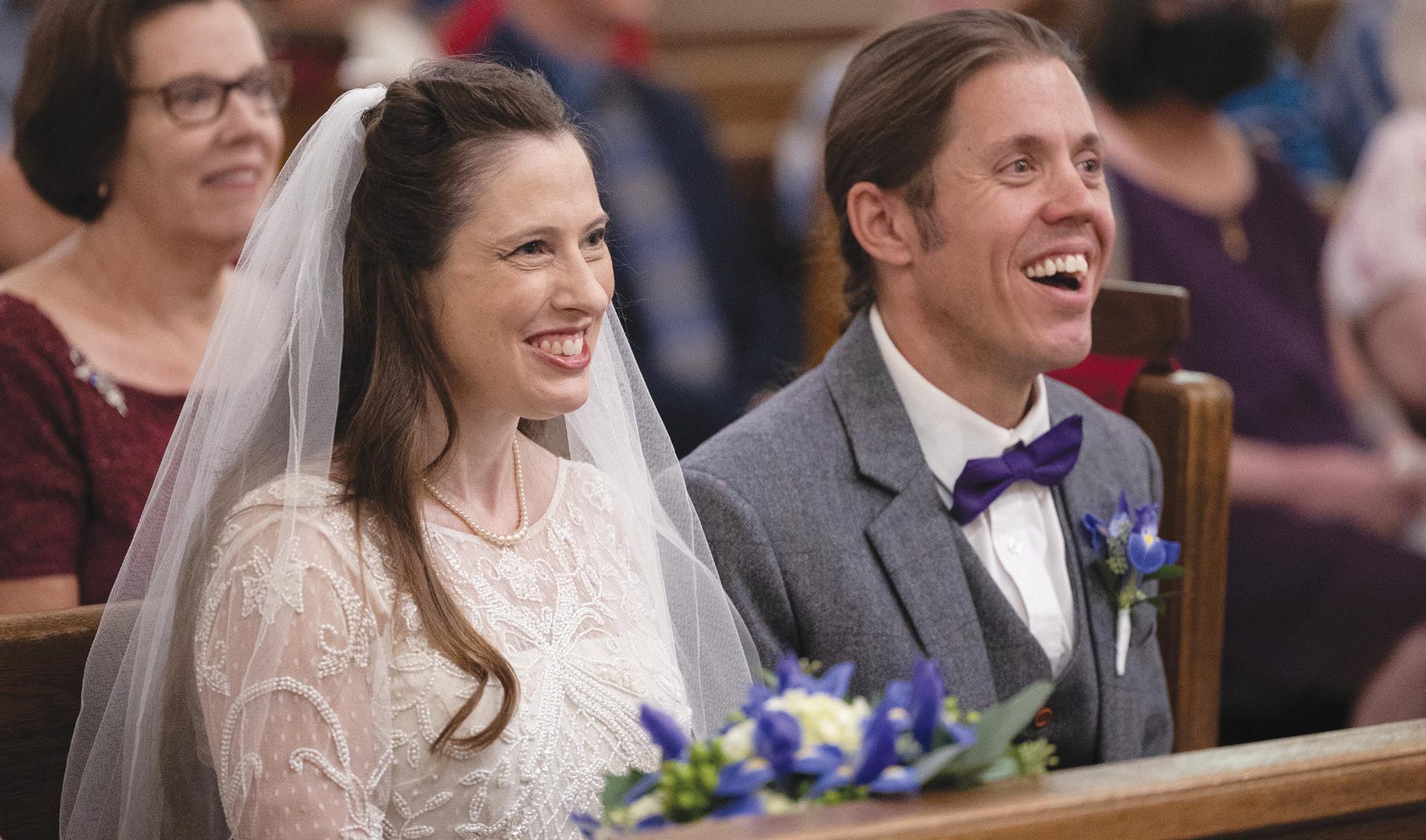
“I don’t like to waste money,” she explained. “So, I thought, ‘OK, if my subscription is still going, I’m going to look at it so that I feel like I’m getting something for however many dollars a day it’s costing me.”
It turned out, there was one week of overlap between when her subscription ran out and the time of John’s posting. “If I had been able to cancel it when I wanted to, we would have never met,” she said.
Even though she agreed to go on a date with John, she made little emotional investment. They chose Turtle Bread Company just two blocks from her house, and decided to meet for lunch.
She didn’t “have a lot of hope for anything (to develop), so I’m like, we’ll go to the place a couple blocks from my house, and it’ll be lunch during my workday, so I’m not going to lose much time. Walk down the block, see this guy, find out that he’s not as cool as his profile indicates, and check that off my list,” she said, not at all believing there would be a second date.
But something happened when they spent time face to face. “I surprised her,” John said. “We had a great lunch.”
What started as a joke she liked on his profile quickly turned into a serious romance. A relationship John described as “very thrilling” led to his proposing to Nicole in early May. Along the way, he met her parents, who likewise saw him as a good fit for their daughter.
“It was pretty clear, pretty quick that they just clicked, and they had these values that were so in sync,” said Nancy, 70. “I think that can be powerful for any couple. … And, I think John has just been a delight. We’ve just loved him. We’ve spent more time laughing and talking, because as value oriented as they are and serious, they’re also a whole bunch of fun. We have just laughed and laughed with them.
And John, we just view him as a really wonderful addition to our family, and we’re looking forward to getting to know him better.”
Nancy wasn’t sure how well the regular 4:30 p.m. Saturday Mass-goers would respond to the invitation to donate money to the couple’s favorite charities — Second Harvest Heartland and Loaves and Fishes. But the results showed the idea was a crowd pleaser. The goal was to solicit donations equal to the budget figure Nicole and John had set for their wedding: $5,000. Anything short of that, the two would make up the difference.
To everyone’s delight, that amount was not only reached but exceeded, with much of it coming the day of the wedding. Though there was no need to make up for a shortfall, Nicole and John, whose last names are now Adams Giardino, chipped in “a little over $500 anyway,” Nicole wrote in an email to The Catholic Spirit 11 days after the wedding. “Additionally, some guests gave to their local food shelves (in multiple states).” She also noted that donations came from people beyond the parish, including other family members, neighbors and friends.
Father Joncas, who served as pastor of St. Cecilia from 1991 to 1993 and got to know the Blume family during that time, said the chance to celebrate Mass and witness the wedding vows of the couple “was a privilege.” Although it may have seemed unusual to some in attendance
that day, “theologically, it makes all the sense in the world,” he said, noting that everything taking place at the Mass that day traces back to baptism.
“They, by making that matrimonial commitment, are really reaffirming their baptismal commitment,” said Father Joncas, 71. “And, their baptismal commitment leads them to service.”
Of added significance, he said, was the fact that they both served as extraordinary ministers of holy Communion during the Mass. “So, their very first act as a married couple is to be of service to the Eucharist.”
As noble as their approach to the sacrament of matrimony sounds, Nicole and John do not want to be placed on a pedestal.
“We are not celebrating our marriage this way because we are especially holy,” Nicole wrote. “We are doing it because we need holiness.”
They understand this as a life-long process, one which they now will work on together.
“John and I share a passion for justice and for sharing the fruits of our faith,” she wrote. “We know that there can be no peace until the hungry are fed (see the second chapter of the Epistle of James). We seek to act with integrity by beginning our marriage according to the Christian values that have formed us. We trust in God’s abundance for ourselves and for our loved ones. We know all of these things through faith.”
20 • THE CATHOLIC SPIRIT SEPTEMBER 28, 2023 THELASTWORD
ABOVE Nicole Adams Blume and John Giardino react to the homily of Father Michael Joncas during Mass Sept. 9 at St. Cecilia in St. Paul.
RIGHT Newly-married John and Nicole Adams Giardino offer Communion to those attending the Mass.


























































 CATHOLIC OR NOTHING | COLIN MILLER
CATHOLIC OR NOTHING | COLIN MILLER








 Story and photos by Dave Hrbacek The Catholic Spirit
Story and photos by Dave Hrbacek The Catholic Spirit
